
Search form
How to write the best college assignments.
By Lois Weldon
When it comes to writing assignments, it is difficult to find a conceptualized guide with clear and simple tips that are easy to follow. That’s exactly what this guide will provide: few simple tips on how to write great assignments, right when you need them. Some of these points will probably be familiar to you, but there is no harm in being reminded of the most important things before you start writing the assignments, which are usually determining on your credits.
The most important aspects: Outline and Introduction
Preparation is the key to success, especially when it comes to academic assignments. It is recommended to always write an outline before you start writing the actual assignment. The outline should include the main points of discussion, which will keep you focused throughout the work and will make your key points clearly defined. Outlining the assignment will save you a lot of time because it will organize your thoughts and make your literature searches much easier. The outline will also help you to create different sections and divide up the word count between them, which will make the assignment more organized.
The introduction is the next important part you should focus on. This is the part that defines the quality of your assignment in the eyes of the reader. The introduction must include a brief background on the main points of discussion, the purpose of developing such work and clear indications on how the assignment is being organized. Keep this part brief, within one or two paragraphs.
This is an example of including the above mentioned points into the introduction of an assignment that elaborates the topic of obesity reaching proportions:
Background : The twenty first century is characterized by many public health challenges, among which obesity takes a major part. The increasing prevalence of obesity is creating an alarming situation in both developed and developing regions of the world.
Structure and aim : This assignment will elaborate and discuss the specific pattern of obesity epidemic development, as well as its epidemiology. Debt, trade and globalization will also be analyzed as factors that led to escalation of the problem. Moreover, the assignment will discuss the governmental interventions that make efforts to address this issue.
Practical tips on assignment writing
Here are some practical tips that will keep your work focused and effective:
– Critical thinking – Academic writing has to be characterized by critical thinking, not only to provide the work with the needed level, but also because it takes part in the final mark.
– Continuity of ideas – When you get to the middle of assignment, things can get confusing. You have to make sure that the ideas are flowing continuously within and between paragraphs, so the reader will be enabled to follow the argument easily. Dividing the work in different paragraphs is very important for this purpose.
– Usage of ‘you’ and ‘I’ – According to the academic writing standards, the assignments should be written in an impersonal language, which means that the usage of ‘you’ and ‘I’ should be avoided. The only acceptable way of building your arguments is by using opinions and evidence from authoritative sources.
– Referencing – this part of the assignment is extremely important and it takes a big part in the final mark. Make sure to use either Vancouver or Harvard referencing systems, and use the same system in the bibliography and while citing work of other sources within the text.
– Usage of examples – A clear understanding on your assignment’s topic should be provided by comparing different sources and identifying their strengths and weaknesses in an objective manner. This is the part where you should show how the knowledge can be applied into practice.
– Numbering and bullets – Instead of using numbering and bullets, the academic writing style prefers the usage of paragraphs.
– Including figures and tables – The figures and tables are an effective way of conveying information to the reader in a clear manner, without disturbing the word count. Each figure and table should have clear headings and you should make sure to mention their sources in the bibliography.
– Word count – the word count of your assignment mustn’t be far above or far below the required word count. The outline will provide you with help in this aspect, so make sure to plan the work in order to keep it within the boundaries.
The importance of an effective conclusion
The conclusion of your assignment is your ultimate chance to provide powerful arguments that will impress the reader. The conclusion in academic writing is usually expressed through three main parts:
– Stating the context and aim of the assignment
– Summarizing the main points briefly
– Providing final comments with consideration of the future (discussing clear examples of things that can be done in order to improve the situation concerning your topic of discussion).
Normal 0 false false false EN-US X-NONE X-NONE /* Style Definitions */ table.MsoNormalTable {mso-style-name:"Table Normal"; mso-tstyle-rowband-size:0; mso-tstyle-colband-size:0; mso-style-noshow:yes; mso-style-priority:99; mso-style-parent:""; mso-padding-alt:0in 5.4pt 0in 5.4pt; mso-para-margin:0in; mso-para-margin-bottom:.0001pt; mso-pagination:widow-orphan; font-size:11.0pt; font-family:"Calibri","sans-serif"; mso-ascii-font-family:Calibri; mso-ascii-theme-font:minor-latin; mso-hansi-font-family:Calibri; mso-hansi-theme-font:minor-latin;}
Lois Weldon is writer at Uk.bestdissertation.com . Lives happily at London with her husband and lovely daughter. Adores writing tips for students. Passionate about Star Wars and yoga.
7 comments on “How To Write The Best College Assignments”
Extremely useful tip for students wanting to score well on their assignments. I concur with the writer that writing an outline before ACTUALLY starting to write assignments is extremely important. I have observed students who start off quite well but they tend to lose focus in between which causes them to lose marks. So an outline helps them to maintain the theme focused.
Hello Great information…. write assignments
Well elabrated
Thanks for the information. This site has amazing articles. Looking forward to continuing on this site.
This article is certainly going to help student . Well written.
Really good, thanks
Practical tips on assignment writing, the’re fantastic. Thank you!
Leave a comment
Your email address will not be published. Required fields are marked *
Save my name, email, and website in this browser for the next time I comment.
- Stanford Home
- Maps & Directions
- Search Stanford
- Emergency Info
- Terms of Use
- Non-Discrimination
- Accessibility
© Stanford University , Stanford , California 94305 .

Choose Your Test
Sat / act prep online guides and tips, how to do homework: 15 expert tips and tricks.
Coursework/GPA

Everyone struggles with homework sometimes, but if getting your homework done has become a chronic issue for you, then you may need a little extra help. That’s why we’ve written this article all about how to do homework. Once you’re finished reading it, you’ll know how to do homework (and have tons of new ways to motivate yourself to do homework)!
We’ve broken this article down into a few major sections. You’ll find:
- A diagnostic test to help you figure out why you’re struggling with homework
- A discussion of the four major homework problems students face, along with expert tips for addressing them
- A bonus section with tips for how to do homework fast
By the end of this article, you’ll be prepared to tackle whatever homework assignments your teachers throw at you .
So let’s get started!

How to Do Homework: Figure Out Your Struggles
Sometimes it feels like everything is standing between you and getting your homework done. But the truth is, most people only have one or two major roadblocks that are keeping them from getting their homework done well and on time.
The best way to figure out how to get motivated to do homework starts with pinpointing the issues that are affecting your ability to get your assignments done. That’s why we’ve developed a short quiz to help you identify the areas where you’re struggling.
Take the quiz below and record your answers on your phone or on a scrap piece of paper. Keep in mind there are no wrong answers!
1. You’ve just been assigned an essay in your English class that’s due at the end of the week. What’s the first thing you do?
A. Keep it in mind, even though you won’t start it until the day before it’s due B. Open up your planner. You’ve got to figure out when you’ll write your paper since you have band practice, a speech tournament, and your little sister’s dance recital this week, too. C. Groan out loud. Another essay? You could barely get yourself to write the last one! D. Start thinking about your essay topic, which makes you think about your art project that’s due the same day, which reminds you that your favorite artist might have just posted to Instagram...so you better check your feed right now.
2. Your mom asked you to pick up your room before she gets home from work. You’ve just gotten home from school. You decide you’ll tackle your chores:
A. Five minutes before your mom walks through the front door. As long as it gets done, who cares when you start? B. As soon as you get home from your shift at the local grocery store. C. After you give yourself a 15-minute pep talk about how you need to get to work. D. You won’t get it done. Between texts from your friends, trying to watch your favorite Netflix show, and playing with your dog, you just lost track of time!
3. You’ve signed up to wash dogs at the Humane Society to help earn money for your senior class trip. You:
A. Show up ten minutes late. You put off leaving your house until the last minute, then got stuck in unexpected traffic on the way to the shelter. B. Have to call and cancel at the last minute. You forgot you’d already agreed to babysit your cousin and bake cupcakes for tomorrow’s bake sale. C. Actually arrive fifteen minutes early with extra brushes and bandanas you picked up at the store. You’re passionate about animals, so you’re excited to help out! D. Show up on time, but only get three dogs washed. You couldn’t help it: you just kept getting distracted by how cute they were!
4. You have an hour of downtime, so you decide you’re going to watch an episode of The Great British Baking Show. You:
A. Scroll through your social media feeds for twenty minutes before hitting play, which means you’re not able to finish the whole episode. Ugh! You really wanted to see who was sent home! B. Watch fifteen minutes until you remember you’re supposed to pick up your sister from band practice before heading to your part-time job. No GBBO for you! C. You finish one episode, then decide to watch another even though you’ve got SAT studying to do. It’s just more fun to watch people make scones. D. Start the episode, but only catch bits and pieces of it because you’re reading Twitter, cleaning out your backpack, and eating a snack at the same time.
5. Your teacher asks you to stay after class because you’ve missed turning in two homework assignments in a row. When she asks you what’s wrong, you say:
A. You planned to do your assignments during lunch, but you ran out of time. You decided it would be better to turn in nothing at all than submit unfinished work. B. You really wanted to get the assignments done, but between your extracurriculars, family commitments, and your part-time job, your homework fell through the cracks. C. You have a hard time psyching yourself to tackle the assignments. You just can’t seem to find the motivation to work on them once you get home. D. You tried to do them, but you had a hard time focusing. By the time you realized you hadn’t gotten anything done, it was already time to turn them in.
Like we said earlier, there are no right or wrong answers to this quiz (though your results will be better if you answered as honestly as possible). Here’s how your answers break down:
- If your answers were mostly As, then your biggest struggle with doing homework is procrastination.
- If your answers were mostly Bs, then your biggest struggle with doing homework is time management.
- If your answers were mostly Cs, then your biggest struggle with doing homework is motivation.
- If your answers were mostly Ds, then your biggest struggle with doing homework is getting distracted.
Now that you’ve identified why you’re having a hard time getting your homework done, we can help you figure out how to fix it! Scroll down to find your core problem area to learn more about how you can start to address it.
And one more thing: you’re really struggling with homework, it’s a good idea to read through every section below. You may find some additional tips that will help make homework less intimidating.

How to Do Homework When You’re a Procrastinator
Merriam Webster defines “procrastinate” as “to put off intentionally and habitually.” In other words, procrastination is when you choose to do something at the last minute on a regular basis. If you’ve ever found yourself pulling an all-nighter, trying to finish an assignment between periods, or sprinting to turn in a paper minutes before a deadline, you’ve experienced the effects of procrastination.
If you’re a chronic procrastinator, you’re in good company. In fact, one study found that 70% to 95% of undergraduate students procrastinate when it comes to doing their homework. Unfortunately, procrastination can negatively impact your grades. Researchers have found that procrastination can lower your grade on an assignment by as much as five points ...which might not sound serious until you realize that can mean the difference between a B- and a C+.
Procrastination can also negatively affect your health by increasing your stress levels , which can lead to other health conditions like insomnia, a weakened immune system, and even heart conditions. Getting a handle on procrastination can not only improve your grades, it can make you feel better, too!
The big thing to understand about procrastination is that it’s not the result of laziness. Laziness is defined as being “disinclined to activity or exertion.” In other words, being lazy is all about doing nothing. But a s this Psychology Today article explains , procrastinators don’t put things off because they don’t want to work. Instead, procrastinators tend to postpone tasks they don’t want to do in favor of tasks that they perceive as either more important or more fun. Put another way, procrastinators want to do things...as long as it’s not their homework!
3 Tips f or Conquering Procrastination
Because putting off doing homework is a common problem, there are lots of good tactics for addressing procrastination. Keep reading for our three expert tips that will get your homework habits back on track in no time.
#1: Create a Reward System
Like we mentioned earlier, procrastination happens when you prioritize other activities over getting your homework done. Many times, this happens because homework...well, just isn’t enjoyable. But you can add some fun back into the process by rewarding yourself for getting your work done.
Here’s what we mean: let’s say you decide that every time you get your homework done before the day it’s due, you’ll give yourself a point. For every five points you earn, you’ll treat yourself to your favorite dessert: a chocolate cupcake! Now you have an extra (delicious!) incentive to motivate you to leave procrastination in the dust.
If you’re not into cupcakes, don’t worry. Your reward can be anything that motivates you . Maybe it’s hanging out with your best friend or an extra ten minutes of video game time. As long as you’re choosing something that makes homework worth doing, you’ll be successful.
#2: Have a Homework Accountability Partner
If you’re having trouble getting yourself to start your homework ahead of time, it may be a good idea to call in reinforcements . Find a friend or classmate you can trust and explain to them that you’re trying to change your homework habits. Ask them if they’d be willing to text you to make sure you’re doing your homework and check in with you once a week to see if you’re meeting your anti-procrastination goals.
Sharing your goals can make them feel more real, and an accountability partner can help hold you responsible for your decisions. For example, let’s say you’re tempted to put off your science lab write-up until the morning before it’s due. But you know that your accountability partner is going to text you about it tomorrow...and you don’t want to fess up that you haven’t started your assignment. A homework accountability partner can give you the extra support and incentive you need to keep your homework habits on track.
#3: Create Your Own Due Dates
If you’re a life-long procrastinator, you might find that changing the habit is harder than you expected. In that case, you might try using procrastination to your advantage! If you just can’t seem to stop doing your work at the last minute, try setting your own due dates for assignments that range from a day to a week before the assignment is actually due.
Here’s what we mean. Let’s say you have a math worksheet that’s been assigned on Tuesday and is due on Friday. In your planner, you can write down the due date as Thursday instead. You may still put off your homework assignment until the last minute...but in this case, the “last minute” is a day before the assignment’s real due date . This little hack can trick your procrastination-addicted brain into planning ahead!

If you feel like Kevin Hart in this meme, then our tips for doing homework when you're busy are for you.
How to Do Homework When You’re too Busy
If you’re aiming to go to a top-tier college , you’re going to have a full plate. Because college admissions is getting more competitive, it’s important that you’re maintaining your grades , studying hard for your standardized tests , and participating in extracurriculars so your application stands out. A packed schedule can get even more hectic once you add family obligations or a part-time job to the mix.
If you feel like you’re being pulled in a million directions at once, you’re not alone. Recent research has found that stress—and more severe stress-related conditions like anxiety and depression— are a major problem for high school students . In fact, one study from the American Psychological Association found that during the school year, students’ stress levels are higher than those of the adults around them.
For students, homework is a major contributor to their overall stress levels . Many high schoolers have multiple hours of homework every night , and figuring out how to fit it into an already-packed schedule can seem impossible.
3 Tips for Fitting Homework Into Your Busy Schedule
While it might feel like you have literally no time left in your schedule, there are still ways to make sure you’re able to get your homework done and meet your other commitments. Here are our expert homework tips for even the busiest of students.
#1: Make a Prioritized To-Do List
You probably already have a to-do list to keep yourself on track. The next step is to prioritize the items on your to-do list so you can see what items need your attention right away.
Here’s how it works: at the beginning of each day, sit down and make a list of all the items you need to get done before you go to bed. This includes your homework, but it should also take into account any practices, chores, events, or job shifts you may have. Once you get everything listed out, it’s time to prioritize them using the labels A, B, and C. Here’s what those labels mean:
- A Tasks : tasks that have to get done—like showing up at work or turning in an assignment—get an A.
- B Tasks : these are tasks that you would like to get done by the end of the day but aren’t as time sensitive. For example, studying for a test you have next week could be a B-level task. It’s still important, but it doesn’t have to be done right away.
- C Tasks: these are tasks that aren’t very important and/or have no real consequences if you don’t get them done immediately. For instance, if you’re hoping to clean out your closet but it’s not an assigned chore from your parents, you could label that to-do item with a C.
Prioritizing your to-do list helps you visualize which items need your immediate attention, and which items you can leave for later. A prioritized to-do list ensures that you’re spending your time efficiently and effectively, which helps you make room in your schedule for homework. So even though you might really want to start making decorations for Homecoming (a B task), you’ll know that finishing your reading log (an A task) is more important.
#2: Use a Planner With Time Labels
Your planner is probably packed with notes, events, and assignments already. (And if you’re not using a planner, it’s time to start!) But planners can do more for you than just remind you when an assignment is due. If you’re using a planner with time labels, it can help you visualize how you need to spend your day.
A planner with time labels breaks your day down into chunks, and you assign tasks to each chunk of time. For example, you can make a note of your class schedule with assignments, block out time to study, and make sure you know when you need to be at practice. Once you know which tasks take priority, you can add them to any empty spaces in your day.
Planning out how you spend your time not only helps you use it wisely, it can help you feel less overwhelmed, too . We’re big fans of planners that include a task list ( like this one ) or have room for notes ( like this one ).
#3: Set Reminders on Your Phone
If you need a little extra nudge to make sure you’re getting your homework done on time, it’s a good idea to set some reminders on your phone. You don’t need a fancy app, either. You can use your alarm app to have it go off at specific times throughout the day to remind you to do your homework. This works especially well if you have a set homework time scheduled. So if you’ve decided you’re doing homework at 6:00 pm, you can set an alarm to remind you to bust out your books and get to work.
If you use your phone as your planner, you may have the option to add alerts, emails, or notifications to scheduled events . Many calendar apps, including the one that comes with your phone, have built-in reminders that you can customize to meet your needs. So if you block off time to do your homework from 4:30 to 6:00 pm, you can set a reminder that will pop up on your phone when it’s time to get started.

This dog isn't judging your lack of motivation...but your teacher might. Keep reading for tips to help you motivate yourself to do your homework.
How to Do Homework When You’re Unmotivated
At first glance, it may seem like procrastination and being unmotivated are the same thing. After all, both of these issues usually result in you putting off your homework until the very last minute.
But there’s one key difference: many procrastinators are working, they’re just prioritizing work differently. They know they’re going to start their homework...they’re just going to do it later.
Conversely, people who are unmotivated to do homework just can’t find the willpower to tackle their assignments. Procrastinators know they’ll at least attempt the homework at the last minute, whereas people who are unmotivated struggle with convincing themselves to do it at a ll. For procrastinators, the stress comes from the inevitable time crunch. For unmotivated people, the stress comes from trying to convince themselves to do something they don’t want to do in the first place.
Here are some common reasons students are unmotivated in doing homework :
- Assignments are too easy, too hard, or seemingly pointless
- Students aren’t interested in (or passionate about) the subject matter
- Students are intimidated by the work and/or feels like they don’t understand the assignment
- Homework isn’t fun, and students would rather spend their time on things that they enjoy
To sum it up: people who lack motivation to do their homework are more likely to not do it at all, or to spend more time worrying about doing their homework than...well, actually doing it.
3 Tips for How to Get Motivated to Do Homework
The key to getting homework done when you’re unmotivated is to figure out what does motivate you, then apply those things to homework. It sounds tricky...but it’s pretty simple once you get the hang of it! Here are our three expert tips for motivating yourself to do your homework.
#1: Use Incremental Incentives
When you’re not motivated, it’s important to give yourself small rewards to stay focused on finishing the task at hand. The trick is to keep the incentives small and to reward yourself often. For example, maybe you’re reading a good book in your free time. For every ten minutes you spend on your homework, you get to read five pages of your book. Like we mentioned earlier, make sure you’re choosing a reward that works for you!
So why does this technique work? Using small rewards more often allows you to experience small wins for getting your work done. Every time you make it to one of your tiny reward points, you get to celebrate your success, which gives your brain a boost of dopamine . Dopamine helps you stay motivated and also creates a feeling of satisfaction when you complete your homework !
#2: Form a Homework Group
If you’re having trouble motivating yourself, it’s okay to turn to others for support. Creating a homework group can help with this. Bring together a group of your friends or classmates, and pick one time a week where you meet and work on homework together. You don’t have to be in the same class, or even taking the same subjects— the goal is to encourage one another to start (and finish!) your assignments.
Another added benefit of a homework group is that you can help one another if you’re struggling to understand the material covered in your classes. This is especially helpful if your lack of motivation comes from being intimidated by your assignments. Asking your friends for help may feel less scary than talking to your teacher...and once you get a handle on the material, your homework may become less frightening, too.
#3: Change Up Your Environment
If you find that you’re totally unmotivated, it may help if you find a new place to do your homework. For example, if you’ve been struggling to get your homework done at home, try spending an extra hour in the library after school instead. The change of scenery can limit your distractions and give you the energy you need to get your work done.
If you’re stuck doing homework at home, you can still use this tip. For instance, maybe you’ve always done your homework sitting on your bed. Try relocating somewhere else, like your kitchen table, for a few weeks. You may find that setting up a new “homework spot” in your house gives you a motivational lift and helps you get your work done.

Social media can be a huge problem when it comes to doing homework. We have advice for helping you unplug and regain focus.
How to Do Homework When You’re Easily Distracted
We live in an always-on world, and there are tons of things clamoring for our attention. From friends and family to pop culture and social media, it seems like there’s always something (or someone!) distracting us from the things we need to do.
The 24/7 world we live in has affected our ability to focus on tasks for prolonged periods of time. Research has shown that over the past decade, an average person’s attention span has gone from 12 seconds to eight seconds . And when we do lose focus, i t takes people a long time to get back on task . One study found that it can take as long as 23 minutes to get back to work once we’ve been distracte d. No wonder it can take hours to get your homework done!
3 Tips to Improve Your Focus
If you have a hard time focusing when you’re doing your homework, it’s a good idea to try and eliminate as many distractions as possible. Here are three expert tips for blocking out the noise so you can focus on getting your homework done.
#1: Create a Distraction-Free Environment
Pick a place where you’ll do your homework every day, and make it as distraction-free as possible. Try to find a location where there won’t be tons of noise, and limit your access to screens while you’re doing your homework. Put together a focus-oriented playlist (or choose one on your favorite streaming service), and put your headphones on while you work.
You may find that other people, like your friends and family, are your biggest distraction. If that’s the case, try setting up some homework boundaries. Let them know when you’ll be working on homework every day, and ask them if they’ll help you keep a quiet environment. They’ll be happy to lend a hand!
#2: Limit Your Access to Technology
We know, we know...this tip isn’t fun, but it does work. For homework that doesn’t require a computer, like handouts or worksheets, it’s best to put all your technology away . Turn off your television, put your phone and laptop in your backpack, and silence notifications on any wearable tech you may be sporting. If you listen to music while you work, that’s fine...but make sure you have a playlist set up so you’re not shuffling through songs once you get started on your homework.
If your homework requires your laptop or tablet, it can be harder to limit your access to distractions. But it’s not impossible! T here are apps you can download that will block certain websites while you’re working so that you’re not tempted to scroll through Twitter or check your Facebook feed. Silence notifications and text messages on your computer, and don’t open your email account unless you absolutely have to. And if you don’t need access to the internet to complete your assignments, turn off your WiFi. Cutting out the online chatter is a great way to make sure you’re getting your homework done.
#3: Set a Timer (the Pomodoro Technique)
Have you ever heard of the Pomodoro technique ? It’s a productivity hack that uses a timer to help you focus!
Here’s how it works: first, set a timer for 25 minutes. This is going to be your work time. During this 25 minutes, all you can do is work on whatever homework assignment you have in front of you. No email, no text messaging, no phone calls—just homework. When that timer goes off, you get to take a 5 minute break. Every time you go through one of these cycles, it’s called a “pomodoro.” For every four pomodoros you complete, you can take a longer break of 15 to 30 minutes.
The pomodoro technique works through a combination of boundary setting and rewards. First, it gives you a finite amount of time to focus, so you know that you only have to work really hard for 25 minutes. Once you’ve done that, you’re rewarded with a short break where you can do whatever you want. Additionally, tracking how many pomodoros you complete can help you see how long you’re really working on your homework. (Once you start using our focus tips, you may find it doesn’t take as long as you thought!)

Two Bonus Tips for How to Do Homework Fast
Even if you’re doing everything right, there will be times when you just need to get your homework done as fast as possible. (Why do teachers always have projects due in the same week? The world may never know.)
The problem with speeding through homework is that it’s easy to make mistakes. While turning in an assignment is always better than not submitting anything at all, you want to make sure that you’re not compromising quality for speed. Simply put, the goal is to get your homework done quickly and still make a good grade on the assignment!
Here are our two bonus tips for getting a decent grade on your homework assignments , even when you’re in a time crunch.
#1: Do the Easy Parts First
This is especially true if you’re working on a handout with multiple questions. Before you start working on the assignment, read through all the questions and problems. As you do, make a mark beside the questions you think are “easy” to answer .
Once you’ve finished going through the whole assignment, you can answer these questions first. Getting the easy questions out of the way as quickly as possible lets you spend more time on the trickier portions of your homework, which will maximize your assignment grade.
(Quick note: this is also a good strategy to use on timed assignments and tests, like the SAT and the ACT !)
#2: Pay Attention in Class
Homework gets a lot easier when you’re actively learning the material. Teachers aren’t giving you homework because they’re mean or trying to ruin your weekend... it’s because they want you to really understand the course material. Homework is designed to reinforce what you’re already learning in class so you’ll be ready to tackle harder concepts later.
When you pay attention in class, ask questions, and take good notes, you’re absorbing the information you’ll need to succeed on your homework assignments. (You’re stuck in class anyway, so you might as well make the most of it!) Not only will paying attention in class make your homework less confusing, it will also help it go much faster, too.

What’s Next?
If you’re looking to improve your productivity beyond homework, a good place to begin is with time management. After all, we only have so much time in a day...so it’s important to get the most out of it! To get you started, check out this list of the 12 best time management techniques that you can start using today.
You may have read this article because homework struggles have been affecting your GPA. Now that you’re on the path to homework success, it’s time to start being proactive about raising your grades. This article teaches you everything you need to know about raising your GPA so you can
Now you know how to get motivated to do homework...but what about your study habits? Studying is just as critical to getting good grades, and ultimately getting into a good college . We can teach you how to study bette r in high school. (We’ve also got tons of resources to help you study for your ACT and SAT exams , too!)
These recommendations are based solely on our knowledge and experience. If you purchase an item through one of our links, PrepScholar may receive a commission.

Ashley Sufflé Robinson has a Ph.D. in 19th Century English Literature. As a content writer for PrepScholar, Ashley is passionate about giving college-bound students the in-depth information they need to get into the school of their dreams.
Student and Parent Forum
Our new student and parent forum, at ExpertHub.PrepScholar.com , allow you to interact with your peers and the PrepScholar staff. See how other students and parents are navigating high school, college, and the college admissions process. Ask questions; get answers.

Ask a Question Below
Have any questions about this article or other topics? Ask below and we'll reply!
Improve With Our Famous Guides
- For All Students
The 5 Strategies You Must Be Using to Improve 160+ SAT Points
How to Get a Perfect 1600, by a Perfect Scorer
Series: How to Get 800 on Each SAT Section:
Score 800 on SAT Math
Score 800 on SAT Reading
Score 800 on SAT Writing
Series: How to Get to 600 on Each SAT Section:
Score 600 on SAT Math
Score 600 on SAT Reading
Score 600 on SAT Writing
Free Complete Official SAT Practice Tests
What SAT Target Score Should You Be Aiming For?
15 Strategies to Improve Your SAT Essay
The 5 Strategies You Must Be Using to Improve 4+ ACT Points
How to Get a Perfect 36 ACT, by a Perfect Scorer
Series: How to Get 36 on Each ACT Section:
36 on ACT English
36 on ACT Math
36 on ACT Reading
36 on ACT Science
Series: How to Get to 24 on Each ACT Section:
24 on ACT English
24 on ACT Math
24 on ACT Reading
24 on ACT Science
What ACT target score should you be aiming for?
ACT Vocabulary You Must Know
ACT Writing: 15 Tips to Raise Your Essay Score
How to Get Into Harvard and the Ivy League
How to Get a Perfect 4.0 GPA
How to Write an Amazing College Essay
What Exactly Are Colleges Looking For?
Is the ACT easier than the SAT? A Comprehensive Guide
Should you retake your SAT or ACT?
When should you take the SAT or ACT?
Stay Informed
Get the latest articles and test prep tips!
Looking for Graduate School Test Prep?
Check out our top-rated graduate blogs here:
GRE Online Prep Blog
GMAT Online Prep Blog
TOEFL Online Prep Blog
Holly R. "I am absolutely overjoyed and cannot thank you enough for helping me!”
- PRO Courses Guides New Tech Help Pro Expert Videos About wikiHow Pro Upgrade Sign In
- EDIT Edit this Article
- EXPLORE Tech Help Pro About Us Random Article Quizzes Request a New Article Community Dashboard This Or That Game Popular Categories Arts and Entertainment Artwork Books Movies Computers and Electronics Computers Phone Skills Technology Hacks Health Men's Health Mental Health Women's Health Relationships Dating Love Relationship Issues Hobbies and Crafts Crafts Drawing Games Education & Communication Communication Skills Personal Development Studying Personal Care and Style Fashion Hair Care Personal Hygiene Youth Personal Care School Stuff Dating All Categories Arts and Entertainment Finance and Business Home and Garden Relationship Quizzes Cars & Other Vehicles Food and Entertaining Personal Care and Style Sports and Fitness Computers and Electronics Health Pets and Animals Travel Education & Communication Hobbies and Crafts Philosophy and Religion Work World Family Life Holidays and Traditions Relationships Youth
- Browse Articles
- Learn Something New
- Quizzes Hot
- This Or That Game New
- Train Your Brain
- Explore More
- Support wikiHow
- About wikiHow
- Log in / Sign up
- Education and Communications
- Study Skills
How to Start an Assignment
Last Updated: January 29, 2024 Fact Checked
This article was co-authored by Michelle Golden, PhD . Michelle Golden is an English teacher in Athens, Georgia. She received her MA in Language Arts Teacher Education in 2008 and received her PhD in English from Georgia State University in 2015. There are 8 references cited in this article, which can be found at the bottom of the page. This article has been fact-checked, ensuring the accuracy of any cited facts and confirming the authority of its sources. This article has been viewed 105,548 times.
Getting started on an assignment or homework can often times be the hardest step. Putting off the assignment can make the problem worse, reducing the time you have to complete the task and increasing stress. By learning how to get started and overcome the urge to procrastinate, you can get your assignments done on schedule and with less stress, opening up more free time.
Restructuring Your Assignment

- For example, you might research areas of a report that you find most interesting before moving on to other areas.
- If your math assignment has different types of questions, try doing those that you enjoy the most before moving on to the others.
- You might also try tackling smaller or easier tasks first so you can cross a few items off your list. Seeing that you've already made progress may help you feel motivated to continue.

- Promise yourself that you will meet your goal of working for five minutes on the assignment.
- Once you get started, you may find that you don't want to stop working. Otherwise, you can take a break and come back to the assignment, knowing you're at least five minutes closer to finishing than you were before.

- Try to set reasonable periods of time that you know you can meet. For example, you might set aside two hours on a Friday to dedicate to your assignment. If you don't have that much time all at once, try to carve out a few 20- or 30-minute blocks.
- You may or may not wish to continue working after your time limit has gone by.
- Have a realistic understanding of how fast you can write and plan your schedule accordingly.

- It can help to read the assignment as soon as you get it and then ask any questions you might have.
- If you're not sure if you understand the assignment, try rewriting it in your own words or explaining it to someone else. If you find you can't or have a lot of questions, you may need more information.
- You should have an overview of the assignment, understand the main task, and understand the technical and stylistic requirements.
- Look for important words in the instructions to understand the assignment. These words might include define, explain, compare, relate, or prove.
- Keep your audience in mind and write a paper that would best deliver information to them.

- Goals that are too big or not well defined can be difficult to start working towards.
- Smaller and well defined goals can seem easier to achieve than larger ones.
- For example, you could break a research paper down into several smaller tasks: 1) do preliminary research, 2) write an outline, 3) draft an introduction, 4) draft body paragraphs, 5) write conclusion, 6) revise. Each of these is much more do-able on its own.
Changing Your Focus

- You might want to go for a quick walk after working for a set amount of time.
- Try reading a website or book that you enjoy for a few minutes after working.
- Alternatively, try a quick burst of exercise before setting to work. Exercise releases feel-good chemicals called endorphins and can also help boost your memory. [8] X Research source

- Instead of dreading your work, focus on how good it will feel to make progress. You won't have it hanging over your head. You can actually enjoy the weekend instead of feeling guilty.
- Keeping your eye on long-term rewards can help you stay motivated to finish your assignment.

- Avoid moving your workspace constantly.
- Don't get lost on tangential research.
- Don't take constant breaks to get a snack.

- For every hour you waste procrastinating, you can limit how much television you watch that night.
- If you waste too much time procrastinating, you might deny yourself a favorite snack later on.

Community Q&A
You Might Also Like

- ↑ https://www.psychologytoday.com/blog/solving-unsolvable-problems/201408/4-steps-stop-procrastinating
- ↑ https://www.psychologytoday.com/blog/friendship-20/201405/the-surefire-first-step-stop-procrastinating
- ↑ http://writingcenter.unc.edu/handouts/procrastination/
- ↑ https://kidshealth.org/en/teens/homework.html
- ↑ http://writingcenter.unc.edu/handouts/understanding-assignments/
- ↑ https://open.alberta.ca/dataset/ab22ff64-3358-4387-9761-8c58878a6b84/resource/3ee38320-17e4-46f9-b24f-c95f9f345eb9/download/ipp7.pdf
- ↑ http://well.blogs.nytimes.com/2013/08/07/how-exercise-can-help-us-learn/
- ↑ https://kidshealth.org/en/teens/happy-life.html
About This Article

To start an assignment, try working on the most enjoyable or easiest parts of the assignment first to get the ball rolling. Even if no part of the assignment seems enjoyable or easy, set a timer and try to make yourself work for at least 5 minutes, which is usually enough time to build momentum and overcome procrastination. You can also try breaking your assignment up into smaller, more manageable tasks and scheduling yourself regular breaks so it doesn't seem as overwhelming. To learn how to stay positive and avoid procrastination while working on your homework, scroll down! Did this summary help you? Yes No
- Send fan mail to authors
Reader Success Stories
Faith Wanjiku
Dec 7, 2018
Did this article help you?
Winnie Wong
May 18, 2016
Turab Ahamad
Oct 23, 2016
Sofia Madrid
Sep 5, 2016
Doha Elabbasi
Sep 27, 2016

Featured Articles

Trending Articles

Watch Articles

- Terms of Use
- Privacy Policy
- Do Not Sell or Share My Info
- Not Selling Info
wikiHow Tech Help Pro:
Level up your tech skills and stay ahead of the curve
College Homework: What You Need to Know
- April 1, 2020
Samantha "Sam" Sparks
- Future of Education
Despite what Hollywood shows us, most of college life actually involves studying, burying yourself in mountains of books, writing mountains of reports, and, of course, doing a whole lot of homework.
Wait, homework? That’s right, homework doesn’t end just because high school did: part of parcel of any college course will be homework. So if you thought college is harder than high school , then you’re right, because in between hours and hours of lectures and term papers and exams, you’re still going to have to take home a lot of schoolwork to do in the comfort of your dorm.
College life is demanding, it’s difficult, but at the end of the day, it’s fulfilling. You might have had this idealized version of what your college life is going to be like, but we’re here to tell you: it’s not all parties and cardigans.
How Many Hours Does College Homework Require?

Here’s the thing about college homework: it’s vastly different from the type of takehome school activities you might have had in high school.
See, high school students are given homework to augment what they’ve learned in the classroom. For high school students, a majority of their learning happens in school, with their teachers guiding them along the way.
In college, however, your professors will encourage you to learn on your own. Yes, you will be attending hours and hours of lectures and seminars, but most of your learning is going to take place in the library, with your professors taking a more backseat approach to your learning process. This independent learning structure teaches prospective students to hone their critical thinking skills, perfect their research abilities, and encourage them to come up with original thoughts and ideas.
Sure, your professors will still step in every now and then to help with anything you’re struggling with and to correct certain mistakes, but by and large, the learning process in college is entirely up to how you develop your skills.
This is the reason why college homework is voluminous: it’s designed to teach you how to basically learn on your own. While there is no set standard on how much time you should spend doing homework in college, a good rule-of-thumb practiced by model students is 3 hours a week per college credit . It doesn’t seem like a lot, until you factor in that the average college student takes on about 15 units per semester. With that in mind, it’s safe to assume that a single, 3-unit college class would usually require 9 hours of homework per week.
But don’t worry, college homework is also different from high school homework in how it’s structured. High school homework usually involves a take-home activity of some kind, where students answer certain questions posed to them. College homework, on the other hand, is more on reading texts that you’ll discuss in your next lecture, studying for exams, and, of course, take-home activities.
Take these averages with a grain of salt, however, as the average number of hours required to do college homework will also depend on your professor, the type of class you’re attending, what you’re majoring in, and whether or not you have other activities (like laboratory work or field work) that would compensate for homework.
Do Students Do College Homework On the Weekends?
Again, based on the average number we provided above, and again, depending on numerous other factors, it’s safe to say that, yes, you would have to complete a lot of college homework on the weekends.
Using the average given above, let’s say that a student does 9 hours of homework per week per class. A typical semester would involve 5 different classes (each with 3 units), which means that a student would be doing an average of 45 hours of homework per week. That would equal to around 6 hours of homework a day, including weekends.
That might seem overwhelming, but again: college homework is different from high school homework in that it doesn’t always involve take-home activities. In fact, most of your college homework (but again, depending on your professor, your major, and other mitigating factors) will probably involve doing readings and writing essays. Some types of college homework might not even feel like homework, as some professors encourage inter-personal learning by requiring their students to form groups and discuss certain topics instead of doing take-home activities or writing papers. Again, lab work and field work (depending on your major) might also make up for homework.

Remember: this is all relative. Some people read fast and will find that 3 hours per unit per week is much too much time considering they can finish a reading in under an hour.The faster you learn how to read, the less amount of time you’ll need to devote to homework.
College homework is difficult, but it’s also manageable. This is why you see a lot of study groups in college, where your peers will establish a way for everyone to learn on a collective basis, as this would help lighten the mental load you might face during your college life. There are also different strategies you can develop to master your time management skills, all of which will help you become a more holistic person once you leave college.
So, yes, your weekends will probably be chock-full of schoolwork, but you’ll need to learn how to manage your time in such a way that you’ll be able to do your homework and socialize, but also have time to develop your other skills and/or talk to family and friends.
College Homework Isn’t All That Bad, Though

Sure, you’ll probably have time for parties and joining a fraternity/sorority, even attend those mythical college keggers (something that the person who invented college probably didn’t have in mind). But I hate to break it to you: those are going to be few and far in between. But here’s a consolation, however: you’re going to be studying something you’re actually interested in.
All of those hours spent in the library, writing down papers, doing college homework? It’s going to feel like a minute because you’re doing something you actually love doing. And if you fear that you’ll be missing out, don’t worry: all those people that you think are attending those parties aren’t actually there because they, too, will be busy studying!
About the Author
News & Updates
How to prepare for your learners permit exam, what concepts can preschoolers learn through a gardening extracurricular, how do pre-k students benefit from an active participatory learning approach.

Understanding Assignments
What this handout is about.
The first step in any successful college writing venture is reading the assignment. While this sounds like a simple task, it can be a tough one. This handout will help you unravel your assignment and begin to craft an effective response. Much of the following advice will involve translating typical assignment terms and practices into meaningful clues to the type of writing your instructor expects. See our short video for more tips.
Basic beginnings
Regardless of the assignment, department, or instructor, adopting these two habits will serve you well :
- Read the assignment carefully as soon as you receive it. Do not put this task off—reading the assignment at the beginning will save you time, stress, and problems later. An assignment can look pretty straightforward at first, particularly if the instructor has provided lots of information. That does not mean it will not take time and effort to complete; you may even have to learn a new skill to complete the assignment.
- Ask the instructor about anything you do not understand. Do not hesitate to approach your instructor. Instructors would prefer to set you straight before you hand the paper in. That’s also when you will find their feedback most useful.
Assignment formats
Many assignments follow a basic format. Assignments often begin with an overview of the topic, include a central verb or verbs that describe the task, and offer some additional suggestions, questions, or prompts to get you started.
An Overview of Some Kind
The instructor might set the stage with some general discussion of the subject of the assignment, introduce the topic, or remind you of something pertinent that you have discussed in class. For example:
“Throughout history, gerbils have played a key role in politics,” or “In the last few weeks of class, we have focused on the evening wear of the housefly …”
The Task of the Assignment
Pay attention; this part tells you what to do when you write the paper. Look for the key verb or verbs in the sentence. Words like analyze, summarize, or compare direct you to think about your topic in a certain way. Also pay attention to words such as how, what, when, where, and why; these words guide your attention toward specific information. (See the section in this handout titled “Key Terms” for more information.)
“Analyze the effect that gerbils had on the Russian Revolution”, or “Suggest an interpretation of housefly undergarments that differs from Darwin’s.”
Additional Material to Think about
Here you will find some questions to use as springboards as you begin to think about the topic. Instructors usually include these questions as suggestions rather than requirements. Do not feel compelled to answer every question unless the instructor asks you to do so. Pay attention to the order of the questions. Sometimes they suggest the thinking process your instructor imagines you will need to follow to begin thinking about the topic.
“You may wish to consider the differing views held by Communist gerbils vs. Monarchist gerbils, or Can there be such a thing as ‘the housefly garment industry’ or is it just a home-based craft?”
These are the instructor’s comments about writing expectations:
“Be concise”, “Write effectively”, or “Argue furiously.”
Technical Details
These instructions usually indicate format rules or guidelines.
“Your paper must be typed in Palatino font on gray paper and must not exceed 600 pages. It is due on the anniversary of Mao Tse-tung’s death.”
The assignment’s parts may not appear in exactly this order, and each part may be very long or really short. Nonetheless, being aware of this standard pattern can help you understand what your instructor wants you to do.
Interpreting the assignment
Ask yourself a few basic questions as you read and jot down the answers on the assignment sheet:
Why did your instructor ask you to do this particular task?
Who is your audience.
- What kind of evidence do you need to support your ideas?
What kind of writing style is acceptable?
- What are the absolute rules of the paper?
Try to look at the question from the point of view of the instructor. Recognize that your instructor has a reason for giving you this assignment and for giving it to you at a particular point in the semester. In every assignment, the instructor has a challenge for you. This challenge could be anything from demonstrating an ability to think clearly to demonstrating an ability to use the library. See the assignment not as a vague suggestion of what to do but as an opportunity to show that you can handle the course material as directed. Paper assignments give you more than a topic to discuss—they ask you to do something with the topic. Keep reminding yourself of that. Be careful to avoid the other extreme as well: do not read more into the assignment than what is there.
Of course, your instructor has given you an assignment so that he or she will be able to assess your understanding of the course material and give you an appropriate grade. But there is more to it than that. Your instructor has tried to design a learning experience of some kind. Your instructor wants you to think about something in a particular way for a particular reason. If you read the course description at the beginning of your syllabus, review the assigned readings, and consider the assignment itself, you may begin to see the plan, purpose, or approach to the subject matter that your instructor has created for you. If you still aren’t sure of the assignment’s goals, try asking the instructor. For help with this, see our handout on getting feedback .
Given your instructor’s efforts, it helps to answer the question: What is my purpose in completing this assignment? Is it to gather research from a variety of outside sources and present a coherent picture? Is it to take material I have been learning in class and apply it to a new situation? Is it to prove a point one way or another? Key words from the assignment can help you figure this out. Look for key terms in the form of active verbs that tell you what to do.
Key Terms: Finding Those Active Verbs
Here are some common key words and definitions to help you think about assignment terms:
Information words Ask you to demonstrate what you know about the subject, such as who, what, when, where, how, and why.
- define —give the subject’s meaning (according to someone or something). Sometimes you have to give more than one view on the subject’s meaning
- describe —provide details about the subject by answering question words (such as who, what, when, where, how, and why); you might also give details related to the five senses (what you see, hear, feel, taste, and smell)
- explain —give reasons why or examples of how something happened
- illustrate —give descriptive examples of the subject and show how each is connected with the subject
- summarize —briefly list the important ideas you learned about the subject
- trace —outline how something has changed or developed from an earlier time to its current form
- research —gather material from outside sources about the subject, often with the implication or requirement that you will analyze what you have found
Relation words Ask you to demonstrate how things are connected.
- compare —show how two or more things are similar (and, sometimes, different)
- contrast —show how two or more things are dissimilar
- apply—use details that you’ve been given to demonstrate how an idea, theory, or concept works in a particular situation
- cause —show how one event or series of events made something else happen
- relate —show or describe the connections between things
Interpretation words Ask you to defend ideas of your own about the subject. Do not see these words as requesting opinion alone (unless the assignment specifically says so), but as requiring opinion that is supported by concrete evidence. Remember examples, principles, definitions, or concepts from class or research and use them in your interpretation.
- assess —summarize your opinion of the subject and measure it against something
- prove, justify —give reasons or examples to demonstrate how or why something is the truth
- evaluate, respond —state your opinion of the subject as good, bad, or some combination of the two, with examples and reasons
- support —give reasons or evidence for something you believe (be sure to state clearly what it is that you believe)
- synthesize —put two or more things together that have not been put together in class or in your readings before; do not just summarize one and then the other and say that they are similar or different—you must provide a reason for putting them together that runs all the way through the paper
- analyze —determine how individual parts create or relate to the whole, figure out how something works, what it might mean, or why it is important
- argue —take a side and defend it with evidence against the other side
More Clues to Your Purpose As you read the assignment, think about what the teacher does in class:
- What kinds of textbooks or coursepack did your instructor choose for the course—ones that provide background information, explain theories or perspectives, or argue a point of view?
- In lecture, does your instructor ask your opinion, try to prove her point of view, or use keywords that show up again in the assignment?
- What kinds of assignments are typical in this discipline? Social science classes often expect more research. Humanities classes thrive on interpretation and analysis.
- How do the assignments, readings, and lectures work together in the course? Instructors spend time designing courses, sometimes even arguing with their peers about the most effective course materials. Figuring out the overall design to the course will help you understand what each assignment is meant to achieve.
Now, what about your reader? Most undergraduates think of their audience as the instructor. True, your instructor is a good person to keep in mind as you write. But for the purposes of a good paper, think of your audience as someone like your roommate: smart enough to understand a clear, logical argument, but not someone who already knows exactly what is going on in your particular paper. Remember, even if the instructor knows everything there is to know about your paper topic, he or she still has to read your paper and assess your understanding. In other words, teach the material to your reader.
Aiming a paper at your audience happens in two ways: you make decisions about the tone and the level of information you want to convey.
- Tone means the “voice” of your paper. Should you be chatty, formal, or objective? Usually you will find some happy medium—you do not want to alienate your reader by sounding condescending or superior, but you do not want to, um, like, totally wig on the man, you know? Eschew ostentatious erudition: some students think the way to sound academic is to use big words. Be careful—you can sound ridiculous, especially if you use the wrong big words.
- The level of information you use depends on who you think your audience is. If you imagine your audience as your instructor and she already knows everything you have to say, you may find yourself leaving out key information that can cause your argument to be unconvincing and illogical. But you do not have to explain every single word or issue. If you are telling your roommate what happened on your favorite science fiction TV show last night, you do not say, “First a dark-haired white man of average height, wearing a suit and carrying a flashlight, walked into the room. Then a purple alien with fifteen arms and at least three eyes turned around. Then the man smiled slightly. In the background, you could hear a clock ticking. The room was fairly dark and had at least two windows that I saw.” You also do not say, “This guy found some aliens. The end.” Find some balance of useful details that support your main point.
You’ll find a much more detailed discussion of these concepts in our handout on audience .
The Grim Truth
With a few exceptions (including some lab and ethnography reports), you are probably being asked to make an argument. You must convince your audience. It is easy to forget this aim when you are researching and writing; as you become involved in your subject matter, you may become enmeshed in the details and focus on learning or simply telling the information you have found. You need to do more than just repeat what you have read. Your writing should have a point, and you should be able to say it in a sentence. Sometimes instructors call this sentence a “thesis” or a “claim.”
So, if your instructor tells you to write about some aspect of oral hygiene, you do not want to just list: “First, you brush your teeth with a soft brush and some peanut butter. Then, you floss with unwaxed, bologna-flavored string. Finally, gargle with bourbon.” Instead, you could say, “Of all the oral cleaning methods, sandblasting removes the most plaque. Therefore it should be recommended by the American Dental Association.” Or, “From an aesthetic perspective, moldy teeth can be quite charming. However, their joys are short-lived.”
Convincing the reader of your argument is the goal of academic writing. It doesn’t have to say “argument” anywhere in the assignment for you to need one. Look at the assignment and think about what kind of argument you could make about it instead of just seeing it as a checklist of information you have to present. For help with understanding the role of argument in academic writing, see our handout on argument .
What kind of evidence do you need?
There are many kinds of evidence, and what type of evidence will work for your assignment can depend on several factors–the discipline, the parameters of the assignment, and your instructor’s preference. Should you use statistics? Historical examples? Do you need to conduct your own experiment? Can you rely on personal experience? See our handout on evidence for suggestions on how to use evidence appropriately.
Make sure you are clear about this part of the assignment, because your use of evidence will be crucial in writing a successful paper. You are not just learning how to argue; you are learning how to argue with specific types of materials and ideas. Ask your instructor what counts as acceptable evidence. You can also ask a librarian for help. No matter what kind of evidence you use, be sure to cite it correctly—see the UNC Libraries citation tutorial .
You cannot always tell from the assignment just what sort of writing style your instructor expects. The instructor may be really laid back in class but still expect you to sound formal in writing. Or the instructor may be fairly formal in class and ask you to write a reflection paper where you need to use “I” and speak from your own experience.
Try to avoid false associations of a particular field with a style (“art historians like wacky creativity,” or “political scientists are boring and just give facts”) and look instead to the types of readings you have been given in class. No one expects you to write like Plato—just use the readings as a guide for what is standard or preferable to your instructor. When in doubt, ask your instructor about the level of formality she or he expects.
No matter what field you are writing for or what facts you are including, if you do not write so that your reader can understand your main idea, you have wasted your time. So make clarity your main goal. For specific help with style, see our handout on style .
Technical details about the assignment
The technical information you are given in an assignment always seems like the easy part. This section can actually give you lots of little hints about approaching the task. Find out if elements such as page length and citation format (see the UNC Libraries citation tutorial ) are negotiable. Some professors do not have strong preferences as long as you are consistent and fully answer the assignment. Some professors are very specific and will deduct big points for deviations.
Usually, the page length tells you something important: The instructor thinks the size of the paper is appropriate to the assignment’s parameters. In plain English, your instructor is telling you how many pages it should take for you to answer the question as fully as you are expected to. So if an assignment is two pages long, you cannot pad your paper with examples or reword your main idea several times. Hit your one point early, defend it with the clearest example, and finish quickly. If an assignment is ten pages long, you can be more complex in your main points and examples—and if you can only produce five pages for that assignment, you need to see someone for help—as soon as possible.
Tricks that don’t work
Your instructors are not fooled when you:
- spend more time on the cover page than the essay —graphics, cool binders, and cute titles are no replacement for a well-written paper.
- use huge fonts, wide margins, or extra spacing to pad the page length —these tricks are immediately obvious to the eye. Most instructors use the same word processor you do. They know what’s possible. Such tactics are especially damning when the instructor has a stack of 60 papers to grade and yours is the only one that low-flying airplane pilots could read.
- use a paper from another class that covered “sort of similar” material . Again, the instructor has a particular task for you to fulfill in the assignment that usually relates to course material and lectures. Your other paper may not cover this material, and turning in the same paper for more than one course may constitute an Honor Code violation . Ask the instructor—it can’t hurt.
- get all wacky and “creative” before you answer the question . Showing that you are able to think beyond the boundaries of a simple assignment can be good, but you must do what the assignment calls for first. Again, check with your instructor. A humorous tone can be refreshing for someone grading a stack of papers, but it will not get you a good grade if you have not fulfilled the task.
Critical reading of assignments leads to skills in other types of reading and writing. If you get good at figuring out what the real goals of assignments are, you are going to be better at understanding the goals of all of your classes and fields of study.
You may reproduce it for non-commercial use if you use the entire handout and attribute the source: The Writing Center, University of North Carolina at Chapel Hill
Make a Gift

- Support TESU
- Request Info

9 Ways to Finish Homework in College Even When You Don't Feel Like It
- Student Success
Do you put the “pro” in procrastinate?
In truth, we’ve all experienced how difficult it feels just to start. So we tend to ignore it and focus on something more fun instead. But then, before we realize, a project that at first seemed manageable now appears next to impossible to complete.
So we go into a deadline-induced panic.
Even if you think you work well under stress and pressure in college, you probably still feel the overwhelming sense of anxiety that accompanies procrastination, whether or not you meet that looming deadline.
But if you want to break your procrastination habit, you can. It’s fixable. All you need is a solid support system and a few clever productivity tactics to keep your self-discipline and focus in check.
So instead of falling into the frantic last-minute cycle again , use this list of tools and strategies to push ahead and finish what needs to be done.
1. Play That Music
Music boosts your energy and keeps you alert. So if you are distracted by the slightest of sounds in a usually quiet atmosphere, music can drown out any spontaneous interruptions. It also has a powerful effect on your mood and recall. When you select the right song to play while studying, writing a paper or posting in the discussion board, the tune can trigger your memory.
2. Find a Study Buddy
If you find it difficult to sit down and create a study guide for your next exam, team up with a few classmates to draft a master study guide. Assign each person a section to work on. Perhaps one of your teammates has a better understanding of the material in a specific section and can help you better grasp the concepts. Then, combine everyone’s work for a complete and comprehensive guide.
3. Grab Your Phone
Use your smartphone to your advantage. Make use of those awkward segments of time throughout the day when you may have a 10-minute opening. Waiting for your kid to finish soccer practice? Have a couple minutes before your meeting starts? Study anytime by loading your notes onto your phone or turning them into digital, on-the-go flashcards.
4. Make It Fun
It’s ok to face it - we avoid tasks because they seem boring. The easiest way to fix this is to make those tasks fun. For example, if you are writing a paper, invite a friend who might have their own work to do to join you at a coffee shop. Or recruit your kids to quiz you on your study material. Your kids will love helping (and they’ll learn something too!).
5. Take Advantage of Web Apps
Writing apps like Hemingway and Grammarly can ease the process of writing papers by helping you write more clearly. Think of these apps as your own personal writing coach. As you write, the app identifies hard to read sentences, as well as awkward phrasing, and promotes better word choices.
6. Set an Alarm
Not just any alarm. One programmed to tell you what you need to do and how it will impact your day. Think, “start working on your paper now and you’ll be able to go to a movie.” If you ignore that one, then set another saying, “if you start your paper now, you can watch an hourlong drama,” and so on. This type of self-reward system can help you better manage your time and still fulfill your wants later on.
7. Recruit a Supervisor
Being accountable to someone is often the drive we need to kick us into gear. Use a similar tactic to ensure your schoolwork is done on time. Ask someone to check on your progress periodically to assure you’re staying on task. This someone can be your spouse, a friend or even your children. Choose wisely, though. You want someone who is serious about helping and won’t try to bother you while you are working. Your teenaged son or daughter will probably be very good at checking up on you and keeping you on task. Maybe even too good.
8. Do Your Least Favorite Work First
When you do your least favorite work first, you will increase your confidence and decrease your stress levels. And, naturally, avoid procrastination later on. Finishing the largest item on your to-do list will give you the productivity boost you need to do other assignments you may have pushed aside.
9. Change Your Perspective
Are things just not right in your usual study space ? Or do you just not like it anymore? Maybe it’s too loud, too quiet, too dark or just too hot. Consider making a change. Try working in your local coffee shop, in a community library or a nearby park. The change in scenery and perspective will impact your productivity for the better.
Written by Thomas Edison State University
Subscribe to the Thomas Edison State University Blog and get the latest updates delivered straight to your inbox.
How to Get Your Homework Done in College
- Before You Arrive
- Health, Safety, and Nutrition
- Living On Campus
- Outside The Classroom
- Graduation & Beyond
- Homework Help
- Private School
- College Admissions
- Graduate School
- Business School
- Distance Learning
- M.Ed., Higher Education Administration, Harvard University
- B.A., English and Comparative Literary Studies, Occidental College
In contrast to the academic requirements of high school, college courses present a much heavier, more consistent workload. And with everything else that college students have to manage -- jobs, personal life, relationships, physical health, cocurricular obligations -- it can sometimes seem like getting your homework done is an impossible feat. At the same time, however, not getting your work done is a recipe for disaster. So, what tips and tricks can you use to get your homework done in college?
Tips for Successfully Doing College Homework
Use these tips to create a process that works for you and your personal study style.
Use a Time Management System
Put all major assignments and their due dates in your time management system . A key part of staying on top of your homework is knowing what's coming; no one, after all, wants to realize on Tuesday that they have a major midterm on Thursday. To avoid surprising yourself, make sure all of your major homework assignments and their due dates are documented in your calendar. That way, you won't inadvertently sabotage your own success simply because you've mismanaged your time.
Schedule Homework Time
Schedule times to do homework each week, and keep those appointments. Without designated time for addressing your to-dos, you're more likely to cram at the last minute, which adds to your anxiety levels.
By putting homework on your calendar, you'll have the time allocated in your already-too-busy schedule, you'll reduce your stress by knowing when, exactly, your homework will be done, and you'll be better able to enjoy whatever else you have planned since you'll know your homework is already taken care of.
Sneak in Your Homework
Use small increments of time whenever possible. You know that 20-minute bus ride you have to and from campus every day? Well, that's 40 minutes a day, 5 days a week which means that if you did some reading during the ride, you'd get more than 3 hours of homework done during your commute.
Those little increments can add up: 30 minutes between classes here, 10 minutes waiting for a friend there. Be smart about sneaking in small bits of homework so that you can conquer the bigger assignments piece by piece.
You Can't Always Get It All Done
Understand that you can't always get all your homework done. One of the biggest skills to learn in college is how to gauge what you can't get done. Because sometimes, there really is only so many hours in a day, and the basic laws of physics mean you can't accomplish everything on your to-do list.
If you just can't get all your homework done, make some smart decisions about how to choose what to do and what to leave behind. Are you doing great in one of your classes, and skipping the reading one week shouldn't hurt too much? Are you failing another and definitely need to focus your efforts there?
Hit the Reset Button
Don't get caught up in the get-caught-up trap. If you fall behind on your homework , it's easy to think -- and hope -- that you'll be able to catch up. So you'll set a plan to catch up, but the more you try to catch up, the more you fall behind. If you're falling behind on your reading and are feeling overwhelmed, give yourself permission to start anew.
Figure out what you need to get done for your next assignment or class, and get it done. It's easier to cover the material you missed when you're studying for an exam in the future than it is to fall further and further behind right now.
Use Your Resources
Use class and other resources to help make doing your homework more productive and efficient. You might, for example, think that you don't need to go to class because the professor only covers what's already been addressed in the reading. Not true.
You should always go to class -- for a variety of reasons -- and doing so can make your homework load lighter. You'll better understand the material, be better able to absorb the work you do out of class, be better prepared for upcoming exams (thereby saving you studying time and improving your academic performance), and overall just have a better mastery of the material. Additionally, use your professor's office hours or time in an academic support center to reinforce what you've learned through your homework assignments. Doing homework shouldn't just be a to-do item on your list; it should be an essential part of your college academic experience.
- Is Homework Good or Bad for Students?
- What to Do When You're Behind in Your College Classes
- 17 Things to Do on a College Campus When You're Bored
- Tips for Preparing for the New School Year
- Top Tips for Succeeding in Statistics Class
- Time Management Tips for Graduate Students
- What to Do When You Feel Overwhelmed in College
- 4 Tips for Completing Your Homework On Time
- How to Stay Organized in College
- How to Survive Your First Year of Law School
- 8 Benefits of Time Management
- How to Reduce Academic Stress
- 50 Differences Between College and High School
- 5 Time Management Tips for Busy Students
- Organize Your Homework With Color Coded Supplies
- 20 Tips for Success in High School
Important Addresses

Harvard College
University Hall Cambridge, MA 02138
Harvard College Admissions Office and Griffin Financial Aid Office
86 Brattle Street Cambridge, MA 02138
Social Links
If you are located in the European Union, Iceland, Liechtenstein or Norway (the “European Economic Area”), please click here for additional information about ways that certain Harvard University Schools, Centers, units and controlled entities, including this one, may collect, use, and share information about you.
- Application Tips
- Navigating Campus
- Preparing for College
- How to Complete the FAFSA
- What to Expect After You Apply
- View All Guides
- Parents & Families
- School Counselors
- Información en Español
- Undergraduate Viewbook
- View All Resources
Search and Useful Links
Search the site, search suggestions, alert: update to standardized testing policy.
Starting with those applying to the Harvard Class of 2029 (entering fall 2025), Harvard College will require the submission of standardized test scores from applicants for admission as part of the whole-person application review process that takes a whole-student approach. Please visit our FAQ for more information .
Last Updated: April 11, 12:37pm
Open Alert: Update to Standardized Testing Policy
"homework" in college.

Since coming to Harvard, I don’t recall even once hearing the word “homework”—which is a pretty strange thing considering the role it played for the first 12 years of my education (spoiler alert: this doesn’t mean that we don’t have assignments and work to do).
However, the type of work that’s assigned in college is different from what I was used to in high school, so I’m here to break it down for you.
Problem Sets
Problem sets, or “psets”, are typically packets of questions that are assigned and due on a regular basis. Most of my pset classes have been math and science courses, although they don’t necessarily have to be. I think the biggest difference between psets in college compared to similar assignments in high school is that they can be really challenging, and many courses expect and encourage students to work together on them—I made some of my best friends while struggling through organic chemistry psets lasts year!
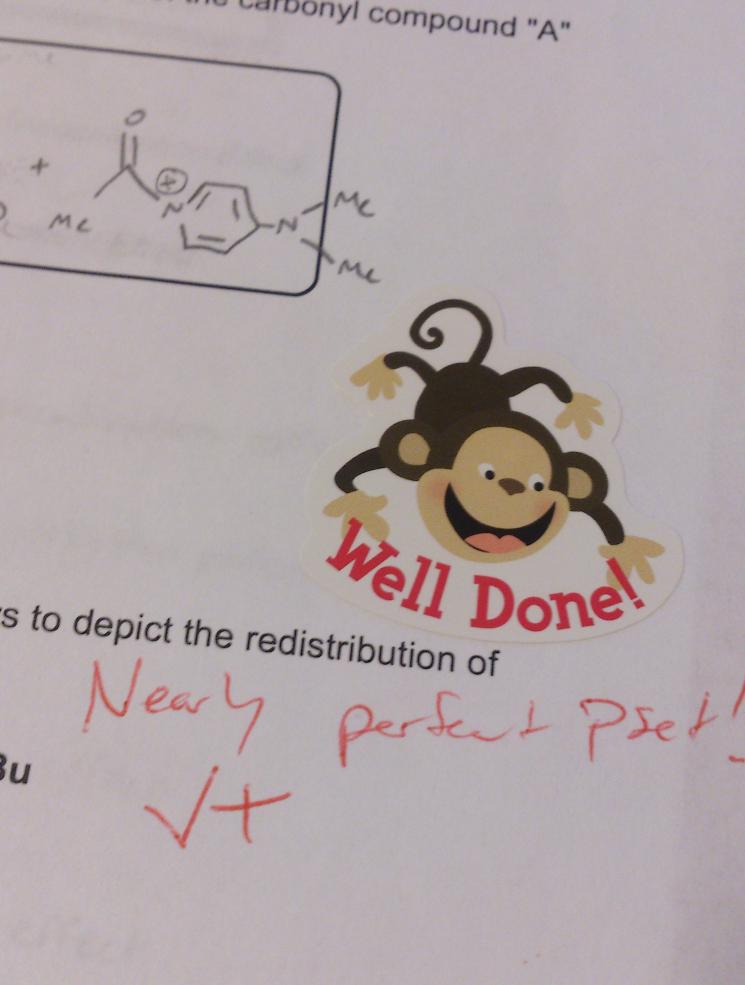
Sometimes you even get stickers.
Rather than lots of shorter assignments, many classes opt for a few essays spaced throughout the semester. Humanities classes (English, history, etc.) are typically essay classes, although many science classes also have you practice scientific writing through grant proposal or review-style papers. If you’re not super comfortable writing academic papers coming into college, not to worry! All freshmen take a writing course (Expos) during the first year to make sure that everyone is on the same foot. There’s a ton of individual feedback, so it can be really beneficial no matter what your level of writing is coming in.
Discussion Posts
Particularly if it’s an essay class, you might be assigned additional questions to respond to on an online forum for the course. It’s a nice way to keep people on track with the reading, and the responses are often used to start discussion in section.
*Most larger courses have weekly “sections” with 12-15 students and a teaching fellow leading discussion—it’s an opportunity to review the material and go more in-depth with the readings.
Reading (sometimes a lot of reading)
One of the bigger adjustments for some students is learning how to get through hundreds of pages of reading per week. Granted, this depends on what type of classes you’re taking—it is possible to tailor your schedule to an amount of reading that’s appropriate for you. I’ve found that my humanities classes have a much higher volume of reading, but that my science courses have denser reading—sometimes a seven page primary lit paper from a science journal takes me the same amount of time to read as forty pages in a novel. If you are struggling to get through all of your assigned reading, or just want to use your time more efficiently, the Bureau of Study Counsel offers “speed reading” courses during the year which are said to be really helpful!

I was found very diligently reading my book.
I have to say, I’ve had some pretty cool project assignments in college. In my multivariable calc class, our final project was to use Mathematica (a math tool) to come up with equations that would form a 3D object, so I made and printed a 3D minion. In a genetics class, we spent the semester analyzing our own DNA in lab, looking for markers that might indicate lactose intolerance, ancestral history, etc. (I wasn’t lactose intolerant, thankfully.) One of my friends is in a Folklore and Mythology class on quilt making, and her final project is to make a quilt. Pretty cool, huh?

My minion!!
Ah yes, not one to forget. On the plus side, there tend to be fewer exams in college than in high school—for classes that do have exams, you would likely only have 1-2 midterms and a final. Studying is often more effective in a group, so it’s another chance to meet people in your class!
Whew! While this is not a complete list, hopefully it gives a sense of the type of work you might be asked to do here. You can choose a schedule of classes that’s a good fit for you—while some people really like taking four essay classes or four pset classes at once, for example, I always try to strike a balance halfway in between. Particularly if you’re taking classes that you’re really interested in, the work doesn’t even seem so bad. :)
Halie Class of Alumni

Student Voices
Dear homesick international student at harvard college.
David Class of '25

The Age of Anxiety: How My Gen Ed Class Has Defined My Junior Spring
Raymond Class of '25

2024 The Academic Comeback - Advice I Wish I Was Given as a First-Year
Samia Afrose Class of '25


Want to create or adapt books like this? Learn more about how Pressbooks supports open publishing practices.
And #11 Successful Students Learn Independently
16 Dealing With Assignments
Understanding your first assignment.
The number of assignments you will receive in a semester often surprises students. For some students, figuring out how to manage assignments is a new experience. For others who have had assignments in the past, the amount of work needed to complete assignments at the college level is what is unexpected. Most of the assignments you will receive will take longer than one session of study to complete. You will likely need to work on your assignment over several days or weeks. In this section, we will provide you with advice on how to understand the requirements of your assignment, and how to manage and track the tasks you will need to complete. We will provide you with some time management tips and an assignment tracker to try.

Assignment Terms
Assignment questions, outlines and marking schemes, breaking down large assignments.
How to breakdown assignments into tasks
- Understand the assignment: Read the assignment instructions carefully, and make sure you understand what is required. If you do not understand what you need to do, ask your professor as soon as possible.
- Create a task list: What are the smaller tasks you need to do to complete this assignment? Smaller tasks are activities like conducting research at the library or setting up group meetings for a group project.
- Create a timeline: Create a timeline that includes all the tasks that need to be completed. Consider how much time you will need to complete that task and when you will work on it. Set due dates for each task.
- Brainstorm ideas: Before you start writing, brainstorm ideas for the assignment. Think about the main points you want to cover, any research you need to do, and any supporting evidence you might need.
- Create an outline: Once you have a list of ideas, create an outline for your assignment. An outline can help you organize your thoughts and make sure you cover all the necessary points.
- Schedule time for research: Do your research before you begin writing. As you find sources, gather the information you will need to create a reference and take notes about essential information the source will provide and where this information fits in with your outline.
- Schedule time for revision: Plan to review your work before you submit. This can include checking your work against the assignment instructions or rubric, making changes to the content, and proofreading.
Here is an example of this process:
Key Takeaway from video
- Breaking down a large or medium-sized assignment into smaller pieces can help reduce stress, ensure completion of all parts of the assignment, and allow you to get other important tasks done too.
Using an Assignment Tracker
Time Management Considerations

Time management is the practice of organizing and prioritizing one’s activities and tasks effectively in order to maximize productivity and achieve one’s goals. For college students, time management involves creating a plan for allocating their time efficiently and balancing academic responsibilities with social activities, work, and personal obligations. It requires identifying tasks and goals, setting realistic deadlines, and using tools such as schedules, to-do lists, and reminders to stay on track. Effective time management helps students to reduce stress, increase productivity, and achieve academic success while still enjoying a balanced lifestyle.
- Procrastination: Students tend to put off starting a large writing assignment until the last minute, leaving themselves with insufficient time to complete the assignment.
- Lack of Planning: Many students do not adequately plan their time for the writing process, which can result in poor time management and a lower quality of work.
- Perfectionism: Students may spend too much time trying to perfect every aspect of their writing, which can lead to time wastage and increased stress.
- Break the Task into Smaller Parts: Instead of attempting to complete the entire assignment in one sitting, break it down into smaller, more manageable parts, and set specific deadlines for each.
- Create a Schedule: Create a schedule for the writing process and stick to it. This will help you stay on track and ensure that you have enough time to complete the assignment.
- Avoid Distractions: Avoid any distractions that can lead to time wastage, such as social media, television, and video games.
- Set Priorities: Set priorities for your writing tasks, focusing on the most critical aspects of the assignment first.
- Use Writing Tools : Utilize writing tools such as spell check, grammar check, and citation generators to save time and reduce the need for extensive revisions.
- Take Breaks: Taking regular breaks can help you stay focused and prevent burnout, ensuring that you produce your best work.
Avoiding Procrastination
Key Takeaways

Want more? The Learning Portal has more ideas for Managing Assignments.
A Guide for Successful Students 2nd ed. Copyright © 2023 by Irene Stewart, Aaron Maisonville, and Nicolai Zriachev, St. Clair College is licensed under a Creative Commons Attribution-NonCommercial-ShareAlike 4.0 International License , except where otherwise noted.
Share This Book
The Bookshelf
Exploring edtech and cognitive psychology.
- NSF Funds Work on Flagging Bad Online Behavior
- Testing AI Fairness in Predicting College Dropout Rate
- Pandemic Lockdowns Boost, Democratize Online Education
- Study Reveals Key Course Features that Draw Diverse Students
- Study: No Single Solution Helps All Students Complete MOOCs
How to Ace Your College Assignments
College can be tough. You’re juggling classes, homework, a social life, and maybe a job on the side. It’s no wonder that sometimes your college assignments don’t get the attention they deserve. But did you know that there are tricks to acing your college assignments? Here are some tips and strategies that will help you get better grades in school!
For many students, college is a big learning curve. It’s a time in your life that involves a lot of change and getting used to many new things. When it comes to college assignments, many students find that things work differently from when they were in high school. The format and types of assessments are different, the criteria for passing can feel unfamiliar, and of course, the level of learning is a step up from high school too.
But getting good grades has a direct impact on your success at college, so it’s important to do as well as you can. So what can you do to get to grips with college assignments so you ace them? Here are some tips.
Read The Instructions
Start by reading the assignment instructions carefully. This may seem obvious, but it’s important to make sure you understand what the task is and what your lecturer or professor is looking for. If you’re unsure about anything, ask for clarification from your instructor. They are there to help you, so you should never feel unsure about going to ask for clarification, or for a little extra direction. You could even ask them what they’re looking for in order to give good grades. For example, is it more about research, or a good writing style? Any tips you can glean from the people marking your assignments will help.
Use Past Papers And Study Materials
When you have a better understanding of what’s required, it can be helpful to use past papers and college study materials to give yourself an idea of the sort of thing that might be expected. Study materials can also give you an idea of the level of detail required and the standard expected by your college. If you’re not sure where to find these things, ask your instructor or librarian for help. Getting hold of some of these past materials will help to give you a framework for your learning, understand the types of assignments your college sets, and what success looks like to them.
Create A Plan And Work Schedule
Once you have a good understanding of the task at hand and what’s expected of you, it’s time to create a plan. This should be a detailed document that outlines everything you need to do in order to complete the assignment to a high standard. Your plan should include a timeline and deadlines for each task, as well as what resources you’ll need and any other information that will help you to complete the assignment.
Work In Short Bursts
One of the best pieces of advice for college students is to work in short bursts . This means setting a timer for a certain amount of time and working on the task at hand for that amount of time, before taking a break. This method is often recommended for students because it’s a more effective way of working than trying to power through for hours on end. It’s also a lot easier to stay focused when you’re working in short bursts. When you take a break, make sure you get up and move around, have a snack, or do something to take your mind off of your work so you can come back refreshed and ready to focus again.
Take Regular Breaks
It’s important to take regular breaks when you’re working on an assignment. This will help to keep you from getting too bogged down in the task and will allow you to come back to it with fresh eyes. When you’re taking a break, make sure you get up and move around, have a snack, or do something to take your mind off of your work so you can come back refreshed and ready to focus again.
Set A Deadline For Yourself
As well as any deadlines set by your instructor, it can be helpful to set a deadline for yourself. This should be a date or time by which you will have completed the assignment. Having a personal deadline will help to keep you on track and motivated to get the work done.
Don’t Leave It To The Last Minute
One of the worst things you can do is leave your college assignment to the last minute. This will only lead to stress and will likely result in a rushed and poorly done piece of work. If you start the assignment early, you’ll have more time to do it properly and you’ll be less likely to make mistakes. It will also give you time to deal with any unexpected circumstances, such as some additional research you decide you need to do, or dealing with a cold that leaves you feeling under the weather for a few days.
Start With The Easy Stuff
When you’re starting an assignment, it can be helpful to start with the easy stuff. This will help to get you into the flow of working on the task and will give you a sense of accomplishment. Once you’ve completed the easy stuff, you can move on to the more challenging tasks. This will help you to stay focused and motivated, and will make the whole process less daunting.
About The Bookshelf
The Bookshelf was founded by a group of Cornell students with the goal of bringing together thought leaders in the field of Educational Technology (EdTech) and cognitive psychology.
If you have any questions about our blog, please get in touch !
- (800) 596-0724
- Request Info
Sophia Sikowski

Your Opinion Matters: Tapping into the Potential of Testimonials

From Interview to Offer: Writing a Winning Follow-Up Email

Maximize Your Student Experience: The Power of Participation

Negotiating 101: Four Tips to Navigate Nurse Compensation
- Scholarships
- Nursing Programs
- Campus Locations
Contact us to request more information
Opt-In to Receive SMS Messages
Get the latest news you need to know, from study hacks to interview tips to career advancement. Have it delivered right to your inbox biweekly.

Campus Leaders is an affiliate for companies including Amazon Associates and earns a commission on qualifying purchases.
How To Keep Up With College Assignments (Ultimate Guide)
Keeping up with college assignments can feel like trying to swim upstream with your hands tied behind your back. Even though this can feel impossible sometimes, there are many things you can do to make your semester go as smoothly and successfully as possible.
Here’s how to keep up with college assignments:
- Keep a weekly planner.
- Take notes by hand.
- Form an accountability group.
- Avoid burnout at all costs.
This article is meant to guide you through your college courses and to help you keep up with your college assignments. You will learn how to keep up with your studies, and how to avoid burnout at the same time. So let’s keep going.
1. Keep a Weekly Planner
If you’re always unsure of what you need to complete in a given week or what’s coming up in your classes, then you’re setting yourself up for failure. Get yourself a weekly planner and organize your thoughts and schedule for the week.
People who use planners are usually much more organized and are able to tackle the events of a week efficiently and effectively. Take an hour at the start of the week, such as Sunday or Monday, and write out everything that you are responsible for that week.
Plan out the best days to complete each so that you’re not crunched for time.
Most weekly planners also have monthly pages, so you can also plan ahead for assignments that may require more than a week’s work. A larger project or final paper might need two or more weeks, so keeping up with the monthly portion will set you up to plan these types of assignments accordingly.
My favorite undated planner is the Clever Fox Undated Weekly and Monthly Planner (link to Amazon). This planner is great because you can pick it up and start whenever since there are no set dates on the pages.
It helps break down large tasks into smaller, more doable ones and helps keep your priorities for the week in order.
I usually recommend this planner for people who are new to using a planner because if you miss a week or struggle to get into the habit of filling it out, you aren’t left with a bunch of blank pages killing your motivation.
Just pick up where you left off.
If you prefer a dated planner, then the Moleskine 12 Month Weekly Planner (link to Amazon) is my go-to, which is what I use for everything. The pages are clean, simple, and easy to keep up with.
There are a few different sizes and colors, but I find that the pocket size in plain black is classic and fits everywhere I need it to.
Things To Avoid in a Weekly Planner
It’s both a blessing and a curse that planners have absolutely skyrocketed in popularity. There are so many to choose from, with a million different sorts of goals in mind. Planners for fitness, water consumption, beer-drinking, inspirational quotes, or knitting progress all exist now.
Being able to pick a planner that fits you best is great. However, these planners are bloated with useless pages and sections. Okay, maybe not useless but not incredibly useful either.
If your planner is meant to help you keep your assignments straight and limit your time procrastinating, then a planner with pages to list all of your favorite moments from the previous day, month, and year won’t help you.
If you want a planner to help practice positivity and gratitude, that’s great. Just keep them separate, and put on one on your nightstand for pleasure and one in your backpack for work.
Schedule a Weekly Catch-Up Day
It can be very helpful to have a day or half-day schedule that’s always reserved for just catching up on work that you have fallen a bit behind on. This isn’t to be scheduled for anything else so that you can always count on some time to just sit and catch up before things get out of hand.
If you’ve been able to keep up that week, having that day completely free is something to look forward to. You can use that time to do whatever you love most.
2. Take Notes by Hand
Your classes are probably full of students typing out their notes on their laptops. This trend has been such a detriment to students being able to retain what they heard in their classes.
One widely cited study concluded that those who take notes on their laptops were much less likely to comprehend the content they were typing. Instead, they were unable to form the concepts that would help them understand the material ( source ).
In addition to laptops inviting a whole host of distractions into the classroom, typed notes are usually more like shallow transcriptions of the lecture. The hand-written notes would help them process the information that was communicated instead.
Students who wrote out their notes with pen and paper were more likely to write out the lectures in their own words . When you take the lecture and translate it into a language that makes the most sense to you, then you’ll have a deeper understanding of the material and the ability to recall the concepts you learned.
If you’re working through your assignments and are able to easily recall the lectures, you’ll be much faster than if you’re staring blankly at the script you wrote out on a laptop.
Leave the technology at home. You’ll have less distraction and will find that you actually need less time to complete your assignments since you’ll have actually learned the material you’re working on.

3. Form an Accountability Group
Something that students report as being a huge help with keeping up on college assignments is having a group of other students keeping them accountable. Some of the different ways that students have formed accountability groups are with group messaging, tackling assignments together, and weekly work meetings.
The best way to form an accountability group will depend on who you have that would be interested in joining. If there’s enough interest in a particular class, then you might find that getting together and working on the weekly assignments together is very helpful.
However, it can be just as helpful to form a weekly group even if the members are in different classes.
In my own undergraduate years, I would form a group of a handful of other students, and we would meet up twice a week to work. Everyone was in different classes and had different work to do, but working together made it much more enjoyable.
4. Avoid Burnout at All Costs
The most important thing you can do to keep up with your college assignments, by far, is to avoid burnout. It doesn’t matter how on top of things you are the first few months if everything falls apart in the last weeks when assignments tend to be worth much more.
Many other articles and academic advisors will stress that you must always put your college classes and their assignments first before anything. However, that’s bad advice.
That’s the advice that led to a generation of burnt-out students and young adults.
Burnout results from long exposure to stress, when you’re under the impression that you’re failing to keep up with your responsibilities or are just barely making it. It’s made up of physical, psychological, and relationship effects on the person ( source ).
Thankfully, the prevalence of burnout is becoming recognized as a serious problem, and universities are beginning to take notice of the effects it has on their student population.
Ultimately, before anything, the thing that should always come first is your own health and well-being. If you’re taking good care of yourself, then getting your work done throughout the whole semester will be much less stressful than if you’re overworking, undersleeping, and at your wits’ end on most days.
The best way to get through the college semester and keep up with your assignments is to prevent burnout from happening in the first place. However, if you do feel as though you’re beginning to have some symptoms, then tackling that and getting your health in order should become the top priority.
Once you’ve recognized that you’re experiencing burnout, if you ignore it and try to keep on trudging through the semester, then you can end up much worse off, both in your health and in your college classes.
Recognizing Warning Signs of Burnout
If you’re worried about whether or not you’re experiencing burnout, look back on the last few weeks of your life and make an honest assessment of how you felt on those days ( source ).
Additionally, begin to keep a journal where you can just quickly write down how you’re feeling physically and mentally. This can be a great tool for reference when looking for symptoms of burnout since memory isn’t always the most reliable guide.
If you’re feeling some of these early signs, then you should seek some help before things begin to snowball:
- You’re feeling drained and exhausted most days.
- Having consistent body and headaches.
- Loss of appetite.
- Problems sleeping.
- Problems with feeling motivated.
- Easily feeling overwhelmed.
- Becoming apathetic towards school, work, and other pastimes.
If you’re experiencing some or all of these signs, then it’s time to seek some outside help. Most colleges provide free counseling services and support groups specifically for burnout since it has become such a burden on students.
Additionally, it might not hurt to reach out to the professors of your classes.
More often than not, they’ll be very empathetic and be willing to create a timetable for you to get back on track in a way that also allows you to recover from the effects of burnout at the same time.

Ways To Combat Burnout
The best offense against burnout is a super strong defense. Taking care of yourself throughout the semester before things get out of hand will be incredibly helpful in keeping your stress levels at a manageable level.
Taking a holistic approach to your life has been shown to do a lot of good when it comes to combating burnout in chronically stressful settings, such as college.
Some of the best things you can do to stave off burnout are:
- Adopting a consistent exercise routine.
- Taking the time to eat well every day.
- Avoid alcohol and other drugs.
- Maintain your friendships and other relationships.
- Give yourself time to relax.
These are just some of the things you can do to try and keep up with your health and well-being. This is super important and will directly translate into further success in college as well ( source ).
Habits To Help Keep Up With College Assignments
Once the semester really begins to pick up, it can feel like you’re drowning in assignments, papers, and studying for exams. Once you start to fall behind, catching backup can be very difficult and exhausting.
Keeping up with college assignments is a lot of hard work.
Everyone struggles to keep up sometimes, so it’s not just you. Many college students feel alone in the struggle, so a good place to start is with the knowledge that this is something that all people at college struggle with from time to time, even the professors.
With this in mind, the difference between students who manage to keep up and those who don’t are usually the implementation of good habits. They have learned how or were taught how to study and work efficiently and have used that knowledge to make good habits to help succeed in college and later in their career too.
By learning what these habits are and practicing them in your own life, you’ll also start to see results in your success at college.
Even when you stumble one week and find yourself procrastinating on an assignment, it’ll be much easier to get back on track if you’ve been practicing the following nine habits for keeping up with college assignments.
Final Thoughts
College is often talked about as some of the best and most exciting times of a person’s life. However, there’s a lot of stress and responsibility in college that isn’t talked about near enough.
Hopefully, with the habits I have discussed in the article, you’ll be able to have all of the fun the college experience has to offer while still keeping up with your college assignments and being successful in your classes!
Recommended Reading:
- Passing Grades in College: Understanding the Impact of a D
- Curved Grades – A Complete College Student’s Guide
- Unweighted vs. Weighted GPA Explained

Emily is an engineer at a Fortune 100 company. Her degree is in Chemical Engineering with minors in Mathematics and Chemistry. She completed 4 internships in college and graduated Summa Cum Laude in 2020. She is from Texas and currently lives in Seattle, WA. Emily loves hiking, traveling, and playing guitar. She is a very proud dog mom to her fur baby, Oliver.
Similar Posts

Is It Worth Buying a Laptop for College? How To Decide
College life happens to be an exciting time in a student’s life, a phase of learning, exploration, and freedom for many. When preparing for college, students tend to ask many questions about what they’d need and what’s a must-have, and what isn’t. More often than not, a laptop for college often takes the top of…

Is It Possible To Change Your College Campus?
You’re feeling rather stuck in your college choice, and there are some things that are beginning to bug you. But can you change your college campus? If you decide to transfer to a different college, or just another campus within the college system, there are several things to consider. It is possible to change your…

Is It Better To Take Courses in the Morning or Afternoon?
College is a time of growth, change, and self-discovery. Students likely feel incredibly excited to start their classes. However, a question arises: Is it better to take courses in the morning or afternoon? Morning classes can be better for students who want to be more alert and need more time throughout the day because of…

Is Out-of-State Tuition Worth It? Here’s How To Decide
College and tuition can be complex when deciding which college is best for you and your circumstances. Education can be expensive, and you may have many questions surrounding if in-state or out-of-state college is right for you. Out-of-state tuition is worth it if the college you choose is right for your educational goals. The price…

What Happens if You Don’t Get Campus Placement?
The security that comes from getting an on-campus placement might be the greatest sense of relief a new college graduate can have. After all, getting your foot in the door is often the biggest hurdle to a long and successful career. However, not getting on-campus placement may end up being a blessing in disguise. If…

How To Make Friends in College: 15 Helpful Approaches
College is the beginning of a new chapter in your life, and for many students, this means making new friends as they leave their hometown for the first time. Jumping headfirst into a brand new place can be intimidating, and making friends may seem impossible. Luckily, that isn’t necessarily the truth. The 15 helpful approaches…

The Admissions Strategist
How does college work the ultimate guide.
If you’re a high school student, you’ve probably spent a lot of time thinking about college applications. You’ve endlessly considered where to apply, how to make your application as competitive as possible, which scholarships to go for, and the list goes on.
But what happens once you’re enrolled in a college? What are the requirements to earn a bachelor’s degree? Do you know exactly what a college credit is? Or how to meet General Education requirements? And what if you decide to go for a master’s degree, or even a PhD ?
If you’re wondering “Wait—how does college work?”, then we’ve got you covered! In this guide, we’ll break down the process of earning a bachelor’s, a master’s, and a PhD. We’ll even explain all those confusing terms that people just assume you already know. We have a lot to talk about, so let’s get started!

Click above to watch a video on what is college.
Undergraduate (Bachelor’s Degree)
The bachelor’s degree is an undergraduate degree that typically takes four years to complete. When you apply to colleges during high school, you’re applying for bachelor’s degree programs. In these programs, you select a major and meet credit and course requirements for that major to graduate. You will need 120 credits to earn a bachelor’s degree.
The two most common bachelor’s degree are the Bachelor of Arts (B.A.) and the Bachelor of Science (B.S.). Some students also choose to pursue a Bachelor of Fine Arts (B.F.A.).
College Majors
Your college major is the area of study you’ll focus on as you pursue your bachelor’s degree. It determines your program of study, or the courses you’ll have to take to earn your degree. The major you choose should prepare you for the career you’d like to go into in the future. Examples of popular college majors include Business, Engineering , Biology, Psychology , and Communication & Journalism.
Some colleges require you to select a major when you apply. Others require you to apply to a specific undergraduate college (like the College of Arts and Sciences). And some schools don’t ask you to make any of these decisions during the application process.
In most cases, these early choices are not binding. Most colleges ask students to declare their major by the end of sophomore year at the latest. You declare your major by filling out a simple form, either online or in the school’s advising center. If you realize the major you chose isn’t a good fit for you, you do have the option to change it later. (But don’t wait too long—changing your major late in your undergraduate career can delay the completion of your degree.)
College Credits
Regardless of your major, you will need to complete 120 credits to earn a bachelor’s degree. Most college courses last for one semester and are worth three credits. This means you’ll need to take about 40 classes to earn your degree, at a rate of around five classes per semester.
You earn credits by passing your classes. If you fail a class, of course, you don’t earn those credits. In college, the concept of “passing” gets a bit complicated. Some schools require you to earn a C or better to pass a class. Others accept a D as passing, but may require a C or higher for the class to count toward your major. And you typically need to have an overall GPA of 2.0 (C average) or better to graduate. Simply put, it’s best not to earn below a C.
It’s important to note that you can’t graduate by passing 40 classes at random. You will have to follow a program of study based on the major you declare. The program of study is generally divided into three parts:

General Education Requirements
- Major Requirements
All colleges require General Education courses , which are designed to give you a broad and well-rounded education. You will spend most of your first two years of college completing these requirements.
Also known as “Gen Ed,” these are low-level courses in subjects like Composition, Humanities, Natural Sciences, and Social and Behavioral Sciences. Your school may require additional subject areas.
You will have to earn a certain amount of credits in each required subject area, as determined by your school. Typically, you’ll need around 36-60 credits total of Gen Ed courses. High scores on AP and IB exams can count toward some of your General Education requirements, meaning you won’t have to take as many Gen Ed classes.
Your college will make it easy to identify which courses can count toward your General Education requirements. For instance, if you can earn Humanities credits for a course, you might see an “H” next to the course’s name in parentheses.
Although you do have to stick to the categories your school requires, you can choose any class you want within those guidelines. Usually, you’ll have plenty of interesting options to choose from!
Degree Requirements
Degree requirements are the specific courses required by your major. For instance, Psychology majors may be required to take classes like Introduction to Psychology, Abnormal Psychology, Statistics, Developmental Psychology, Research in Experimental Psychology, etc. in order to earn their degree.
Many of these degree requirements are upper-level classes. That means you can’t take them right away; you’ll need to earn a certain amount of credits first. Some of these classes will also have prerequisites , or other classes you must pass first. For example, you’ll likely be required to pass Introduction to Psychology before you can sign up for Abnormal Psychology.
Similar to Gen Ed requirements, you can expect your degree requirements to total about 40-60 credits. You can use leftover credits for free electives , which basically translates to “whatever you want.” That means even a Physics major can take Basket Weaving, History of Jazz, and Introduction to Popular Film to get the last of those 120 credits (as long as there are no prerequisites keeping you out).
If this all sounds complicated, don’t worry. Your college will clearly outline the General Education requirements, degree requirements, and free electives you need to earn your degree. Most likely, you’ll also have access to an online portal that shows you which requirements you’ve completed, and which classes you still need to take. And if you ever have questions, professors and advisors are there to help.
Once you’ve met all the necessary requirements, you’ll graduate with your bachelor’s degree! Then, you can start your career or continue with your education.
Get personalized advice!
Graduate (master’s degree).
After you finish your bachelor’s, the next degree you can choose to earn is a master’s degree . The application process for master’s programs is very similar to the application process for bachelor’s programs and may involve an interview. It’s worthwhile to earn a master’s degree if it’s required for your dream job, or if you’ll earn significantly more money in your future career with a higher degree.
Master’s programs build upon the foundational knowledge you learned in your bachelor’s degree program. You gain the in-depth skills and knowledge needed to become an expert or specialist in your field. Most master’s degrees require 30-40 credits and take about two years to complete.
Since the master’s program is more accelerated, all or most of these credits will consist of specific degree requirements. You may also be required to complete practicums, internships, and/or research projects. Some programs require you to present your research at seminars or submit it for publication in journals and periodicals. During graduate school, you can expect smaller class sizes, more discussions, and significantly more reading.
Final Projects
Many master’s programs require you to submit an extensive final research paper known as a master’s thesis . You may have the option to choose between a “thesis track” and a “non-thesis track.” If you choose the non-thesis track, you’ll still have a final project, but it may be a field experience or a capstone project instead.
Capstone project is a broad term for a culminating assignment that requires you to apply what you’ve learned during the master’s program. Depending on your area of study, it might involve creating a portfolio, conducting original research, or presenting your solution to a common problem in the field.
When you’ve completed the requirements for your master’s degree, it’s time to graduate! This time, you get to wear a fancy hood in addition to the traditional cap and gown. Then, you’re once again faced with the decision to launch your career or continue down the path to academia.
Doctoral Degrees
Doctoral degrees are called terminal degrees, meaning they’re the highest degree you can earn in the field. Most careers do not require this level of education, but you may need a PhD for a career in academia or research. PhD programs vary widely, with most requiring 60-120 credits and taking 5-8 years to complete. This time is typically divided between coursework and the dissertation.
The application process is again similar. Requirements may include a resume, three letters of recommendation, competitive scores on graduate exams, a statement of purpose, and an interview. These programs admit a small number of applicants and are highly competitive.
There are two main types of doctoral degrees: applied doctorates and research-based doctorates. Here, we’ll focus on research-based doctorates (PhDs), as each applied doctorate has its own unique path.
In general, the first 2-3 years of a PhD program are spent on highly specialized coursework. You can expect even more discussion and reading than you experienced in your master’s program.
Many PhD students also work as Teacher Assistants , or TAs. They assist professors with teaching classes and grading papers. Depending on your subject area, you may also conduct research and spend time in labs for the duration of the program.
Most PhD programs require students to pass exams at various points in the program. At the end of the first year, students may take a comprehensive exam to test their knowledge. They must pass this exam before they can be admitted to the next level of the program. Some schools give students a certain number of chances to pass this exam, while others have a time limit.
Later in the program, students will take a candidacy exam to progress to the dissertation. This exam is sometimes known as a “qualifying exam.” The exam generally includes both a written and oral portion and is evaluated by a committee. Students must pass the exam to continue to the dissertation portion of the PhD program. Many programs give students two opportunities to pass; if they do not, they are removed from the program.
Dissertation
The dissertation is the final requirement of the PhD program. It takes 2-3 years to complete, and sometimes even longer. It’s a book-like document that contributes new research to the PhD candidate’s field and demonstrates expert knowledge.
After extensive research and writing, candidates present the dissertation to a committee. This is called “defending” the dissertation. Defending the dissertation also involves answering questions from the committee, thus defending that the assertions in the dissertation are valid and stand up to examination.
Once you’ve completed required coursework, passed the candidacy exam, and successfully defended your dissertation, you earn your PhD. At this graduation, you’ll wear an elaborate gown, typically with velvet trim. Now that you’ve earned the highest degree possible, you can work in research, academia, or a highly paid position in another field.
Final Thoughts: How Does College Work?
Whether you’re planning to earn a bachelor’s, master’s, or PhD, we hope we’ve cleared up any confusion about how college works.
It’s not as complicated or as overwhelming as you might think. Your school will help you navigate requirements and ensure you’re able to successfully travel the path to graduation!
Learn how we can help you with college and career guidance! Check out our YouTube channel!
Click Here to Schedule a Free Consult!

Stay on track and ease your anxiety with our second-to-none college application assistance.

- Ethics & Honesty
- Privacy Policy
- Join Our Team
(732) 339-3835
3.5 Prioritization: Self-Management of What You Do and When You Do It
Questions to Consider:
- Why is prioritization important?
- What are the steps involved in prioritization?
- How do I deal with situation where others’ priorities are not the same as my own?
- What do I do when priorities conflict?
- What are the best ways to make sure I complete tasks?
Prioritization: Self-Management of What You Do and When You Do It
Another key component in time management is that of prioritization. Prioritization can be thought of as ordering tasks and allotting time for them based on their identified needs or value.
This next section provides some insight into not only helping prioritize tasks and actions based on need and value, but also how to better understand the factors that contribute to prioritization.
How to Prioritize
The enemy of good prioritization is panic, or at least making decisions based on strictly emotional reactions. It can be all too easy to immediately respond to a problem as soon as it pops up without thinking of the consequences of your reaction and how it might impact other priorities. It is very natural for us to want to remove a stressful situation as soon as we can. We want the adverse emotions out of the way as quickly as possible. But when it comes to juggling multiple problems or tasks to complete, prioritizing them first may mean the difference between completing everything satisfactorily and completing nothing at all.
Make Certain You Understand the Requirements of Each Task
One of the best ways to make good decisions about the prioritization of tasks is to understand the requirements of each. If you have multiple assignments to complete and you assume one of those assignments will only take an hour, you may decide to put it off until the others are finished. Your assumption could be disastrous if you find, once you begin the assignment, that there are several extra components that you did not account for and the time to complete will be four times as long as you estimated. Or, one of the assignments may be dependent on the results of another—like participating in a study and then writing a report on the results. If you are not aware that one assignment depends upon the completion of the other before you begin, you could inadvertently do the assignments out of order and have to start over. Because of situations like this, it is critically important to understand exactly what needs to be done to complete a task before you determine its priority.
Make Decisions on Importance, Impact on Other Priorities, and Urgency
After you are aware of the requirements for each task, you can then decide your priorities based on the importance of the task and what things need to be finished in which order.
To summarize: the key components to prioritization are making certain you understand each task and making decisions based on importance, impact, and urgency.
To better see how things may need to be prioritized, some people make a list of the tasks they need to complete and then arrange them in a quadrant map based on importance and urgency. Traditionally this is called the Eisenhower Decision Matrix. Before becoming the 34th president of the United States, Dwight Eisenhower served as the Allied forces supreme commander during World War II and said he used this technique to better prioritize the things he needed to get done.
In this activity you will begin by making a list of things you need or want to do today and then draw your own version of the grid below. Write each item in one of the four squares; choose the square that best describes it based on its urgency and its importance. When you have completed writing each the tasks in its appropriate square, you will see a prioritization order of your tasks. Obviously, those listed in the Important and Urgent square will be the things you need to finish first. After that will come things that are “important but not urgent,” followed by “not important, but urgent,” and finally “not urgent and not important.”
Who Is Driving Your Tasks?
Another thing to keep in mind when approaching time management is that while you may have greater autonomy in managing your own time, many of your tasks are being driven by a number of different individuals. These individuals are not only unaware of the other things you need to do, but they often have goals that are in conflict with your other tasks. This means that different instructors, your manager at work, or even your friends may be trying to assert their needs into your priorities. An example of this might be a boss that would like for you to work a few hours of overtime, but you were planning on using that time to do research for a paper.
Just like assessing the requirements and needs for each priority, doing the same with how others may be influencing your available time can be an important part of time management. In some cases, keeping others informed about your priorities may help avert possible conflicts (e.g., letting your boss know you will need time on a certain evening to study, letting your friends know you plan to do a journal project on Saturday but can do something on Sunday, etc.).
It will be important to be aware of how others can drive your priorities and for you to listen to your own good judgment. In essence, time management in college is as much about managing all the elements of your life as it is about managing time for class and to complete assignments.
Making the Tough Decision When It Is Needed
Occasionally, regardless of how much you have planned or how well you have managed your time, events arise where it becomes almost impossible to accomplish everything you need to by the time required. While this is very unfortunate, it simply cannot be helped. As the saying goes, “things happen.”
Finding yourself in this kind of situation is when prioritization becomes most important. You may find yourself in the uncomfortable position of only being able to complete one task or another in the time given. When this occurs with college assignments, the dilemma can be extremely stressful, but it is important to not feel overwhelmed by the anxiety of the situation so that you can make a carefully calculated decision based on the value and impact of your choice.
“What do you do when faced with priority conflicts?”
As an illustration, imagine a situation where you think you can only complete one of two assignments that are both important and urgent, and you must make a choice of which one you will finish and which one you will not. This is when it becomes critical to understand all the factors involved. While it may seem that whichever assignment is worth the most points to your grade is how you make the choice, there are actually a number of other attributes that can influence your decision in order to make the most of a bad situation. For example, one of the assignments may only be worth a minimal number of points toward your total grade, but it may be foundational to the rest of the course. Not finishing it, or finishing it late, may put other future assignments in jeopardy as well. Or the instructor for one of the courses might have a “late assignment” policy that is more forgiving—something that would allow you to turn in the work a little late without too much of a penalty.
If you find yourself in a similar predicament, the first step is to try to find a way to get everything finished, regardless of the challenges. If that simply cannot happen, the next immediate step would be to communicate with your instructors to let them know about the situation. They may be able to help you decide on a course of action, or they may have options you had not thought of. Only then can you make the choices about prioritizing in a tough situation.
The key here is to make certain you are aware of and understand all the ramifications to help make the best decision when the situation dictates you make a hard choice among priorities.
Completing the Tasks
Another important part of time management is to develop approaches that will help you complete tasks in a manner that is efficient and works for you. Most of this comes down to a little planning and being as informed about the specifics of each task as you can be.
Knowing What You Need to Do
As discussed in previous parts of this chapter, many learning activities have multiple components, and sometimes they must occur in a specific order. Additionally, some elements may not only be dependent on the order they are completed, but can also be dependent on how they are completed. To illustrate this we will analyze a task that is usually considered to be a simple one: attending a class session. In this analysis we will look at not only what must be accomplished to get the most out of the experience, but also at how each element is dependent upon others and must be done in a specific order. The graphic below shows the interrelationship between the different activities, many of which might not initially seem significant enough to warrant mention, but it becomes obvious that other elements depend upon them when they are listed out this way.
As you can see from the graphic above, even a task as simple as “going to class” can be broken down into a number of different elements that have a good deal of dependency on other tasks. One example of this is preparing for the class lecture by reading materials ahead of time in order to make the lecture and any complex concepts easier to follow. If you did it the other way around, you might miss opportunities to ask questions or receive clarification on the information presented during the lecture.
Understanding what you need to do and when you need to do it can be applied to any task, no matter how simple or how complex. Knowing what you need to do and planning for it can go a long way toward success and preventing unpleasant surprises.
Knowing How You Will Get It Done
After you have a clear understanding of what needs to be done to complete a task (or the component parts of a task), the next step is to create a plan for completing everything.
This may not be as easy or as simple as declaring that you will finish part one, then move on to part two, and so on. Each component may need different resources or skills to complete, and it is in your best interest to identify those ahead of time and include them as part of your plan.
A good analogy for this sort of planning is to think about it in much the same way you would preparing for a lengthy trip. With a long journey you probably would not walk out the front door and then decide how you were going to get where you were going. There are too many other decisions to be made and tasks to be completed around each choice. If you decided you were going by plane, you would need to purchase tickets, and you would have to schedule your trip around flight times. If you decided to go by car, you would need gas money and possibly a map or GPS device. What about clothes? The clothes you will need are dependent on how long will you be gone and what the climate will be like. If it far enough away that you will need to speak another language, you may need to either acquire that skill or at least come with something or someone to help you translate.
What follows is a planning list that can help you think about and prepare for the tasks you are about to begin.
What Resources Will You Need?
The first part of this list may appear to be so obvious that it should go without mention, but it is by far one of the most critical and one of the most overlooked. Have you ever planned a trip but forgotten your most comfortable pair of shoes or neglected to book a hotel room? If a missing resource is important, the entire project can come to a complete halt. Even if the missing resource is a minor component, it may still dramatically alter the end result.
Learning activities are much the same in this way, and it is also important to keep in mind that resources may not be limited to physical objects such as paper or ink. Information can be a critical resource as well. In fact, one of the most often overlooked aspects in planning by new college students is just how much research, reading, and information they will need to complete assignments.
For example, if you had an assignment in which you were supposed to compare and contrast a novel with a film adapted from that novel, it would be important to have access to both the movie and the book as resources. Your plans for completing the work could quickly fall apart if you learned that on the evening you planned to watch the film, it was no longer available.
What Skills Will You Need?
Poor planning or a bad assumption in this area can be disastrous, especially if some part of the task has a steep learning curve. No matter how well you planned the other parts of the project, if there is some skill needed that you do not have and you have no idea how long it will take to learn, it can be a bad situation.
Imagine a scenario where one of your class projects is to create a poster. It is your intent to use some kind of imaging software to produce professional-looking graphics and charts for the poster, but you have never used the software in that way before. It seems easy enough, but once you begin, you find the charts keep printing out in the wrong resolution. You search online for a solution, but the only thing you can find requires you to recreate them all over again in a different setting. Unfortunately, that part of the project will now take twice as long.
It can be extremely difficult to recover from a situation like that, and it could have been prevented by taking the time to learn how to do it correctly before you began or by at least including in your schedule some time to learn and practice.
Set Deadlines
Of course, the best way to approach time management is to set realistic deadlines that take into account which elements are dependent on which others and the order in which they should be completed. Giving yourself two days to write a 20- page work of fiction is not very realistic when even many professional authors average only 6 pages per day. Your intentions may be well founded, but your use of unrealistic deadlines will not be very successful.
Setting appropriate deadlines and sticking to them is very important—so much so that several sections in the rest of this chapter touch on effective deadline practices.
Be Flexible
It is ironic that the item on this list that comes just after a strong encouragement to make deadlines and stick to them is the suggestion to be flexible. The reason that being flexible has made this list is because even the best-laid plans and most accurate time management efforts can take an unexpected turn. The idea behind being flexible is to readjust your plans and deadlines when something does happen to throw things off. The worst thing you could do in such a situation is panic or just stop working because the next step in your careful planning has suddenly become a roadblock. The moment when you see that something in your plan may become an issue is when to begin readjusting your plan.
Adjusting a plan along the way is incredibly common. In fact, many professional project managers have learned that it seems something always happens or there is always some delay, and they have developed an approach to deal with the inevitable need for some flexibility. In essence, you could say that they are even planning for problems, mistakes, or delays from the very beginning, and they will often add a little extra time for each task to help ensure an issue does not derail the entire project or that the completion of the project does not miss the final due date.
“As you work through tasks, make certain you are always monitoring and adapting to ensure you complete them.”
Student Profile
“While in college, I recall an instance where I was awake for two nights in a row trying to cram for upcoming midterms. I quickly learned that trying to navigate through college while working full time posed a significant challenge. Because of inability to manage my responsibilities, my first year of college was quite miserable. I went through a lot of trial and error to find out that time management was the key. From my experiences, I have extrapolated three important components to this skill. First, knowing your values is imperative. Values will serve as a guide, which will help you to determine which actions bring you closer to your goals and those that don't. Second, know your constraints . Constraints (in form of time or other responsibilities) can help you set the parameter within which you can function efficiently. The last component is action . This component was the hardest for me to master, but it was the most fruitful. Because knowing values and limitations without engaging in appropriate actions does not serve any meaningful purpose. I strongly believe that learning time management can contribute greatly towards positive university experience.”
—Firdavs Khaydarov , Psychology Major, Minnesota State University, Mankato
The Importance of Where You Do Your Work
A large part of ensuring that you can complete tasks on time comes to setting up conditions that will allow you to do the work well. Much of this has to do with the environment where you will do your work. This not only includes physical space such as a work area, but other conditions like being free from distractions and your physical well-being and mental attitude.
The Right Space
Simple things, like where you are set up to do your work, can not only aid in your efficiency but also affect how well you can work or even if you can get the work completed at all. One example of this might be typing on a laptop. While it might seem more comfortable to lie back on a couch and type a long paper, sitting up at a desk or table actually increases your typing speed and reduces the number of mistakes. Even the kind of mouse you use can impact how you work, and using one you are comfortable with can make a big difference.
There are a host of other factors that can come into play as well. Do you have enough space? Is the space cluttered, or do you have the room to keep reference materials and other things you might need within arm’s reach? Are there other ways you could work that might be even more efficient? For example, buying an inexpensive second monitor—even secondhand—might be the key to decreasing the amount of time you spend when you can have more than one document displayed at a time.
The key is to find what works for you and to treat your work space as another important resource needed to get the task finished.
Distraction Free
Few things are more frustrating than trying to do work while distractions are going on around you. If other people are continually interrupting you or there are things that keep pulling your attention from the task at hand, everything takes longer and you are more prone to mistakes. 4
Many people say they work better with distractions—they prefer to leave the television or the radio on—but the truth is that an environment with too many interruptions is rarely helpful when focus is required. Before deciding that the television or talkative roommates do not bother you when you work, take an honest accounting of the work you produce with interruptions compared to work you do without.
If you find that your work is better without distractions, it is a good idea to create an environment that reduces interruptions. This may mean you have to go to a private room, use headphones, or go somewhere like a library to work. Regardless, the importance of a distraction-free environment cannot be emphasized enough.
Working at the Right Time
Most people are subject to their own rhythms, cycles, and preferences throughout their day. Some are alert and energetic in the mornings, while others are considered “night owls” and prefer to work after everyone else has gone to sleep. It can be important to be aware of your own cycles and to use them to your advantage. Rarely does anyone do their best work when they are exhausted, either physically or mentally. Just as it can be difficult to work when you are physically ill, it can also be a hindrance to try to learn or do mental work when you are tired or emotionally upset.
Your working environment definitely includes your own state of mind and physical well-being. Both have a significant influence on your learning and production ability. Because of this, it is not only important to be aware of your own condition and work preferences, but to actually try to create conditions that help you in these areas. One approach is to set aside a specific time to do certain kinds of work. You might find that you concentrate better after you have eaten a meal. If that is the case, make it a habit of doing homework every night after dinner. Or you might enjoy reading more after you are ready for bed, so you do your reading assignments just before you go to sleep at night. Some people find that they are more creative during a certain time of the day or that they are more comfortable writing with subtle lighting. It is worth taking the time to find the conditions that work best for you so that you can take advantage of them.
Analysis Question
Student survey on work environment.
Analysis: Take the time to think about where you will do your work and when. What can you do to help ensure your working environment will be helpful rather than harmful? What do you know doesn’t work for you? What will you do to prevent those adverse conditions from creeping into your work environment?
Below is a quick survey to help you determine your own preferences in regard to your work space, the time you work, and distractions. Rank each option: 1–4, 1 meaning “least like me” and 4 meaning “most like me.”
- I like my workspace to be organized and clean.
- There are certain places where I am more comfortable when I work.
- I prefer to be alone when I work on certain things.
- I find it difficult to read with other sounds or voices around me.
- There are certain times of the day when I can be more focused.
- My moods or emotions can interfere with my ability to concentrate
- 4 https://en.calameo.com/read/00009178915b8f5b352ba
As an Amazon Associate we earn from qualifying purchases.
This book may not be used in the training of large language models or otherwise be ingested into large language models or generative AI offerings without OpenStax's permission.
Want to cite, share, or modify this book? This book uses the Creative Commons Attribution License and you must attribute OpenStax.
Access for free at https://openstax.org/books/college-success/pages/1-introduction
- Authors: Amy Baldwin
- Publisher/website: OpenStax
- Book title: College Success
- Publication date: Mar 27, 2020
- Location: Houston, Texas
- Book URL: https://openstax.org/books/college-success/pages/1-introduction
- Section URL: https://openstax.org/books/college-success/pages/3-5-prioritization-self-management-of-what-you-do-and-when-you-do-it
© Sep 20, 2023 OpenStax. Textbook content produced by OpenStax is licensed under a Creative Commons Attribution License . The OpenStax name, OpenStax logo, OpenStax book covers, OpenStax CNX name, and OpenStax CNX logo are not subject to the Creative Commons license and may not be reproduced without the prior and express written consent of Rice University.

- Walden University
- Faculty Portal
Common Assignments: Journal Entries
Basics of journal entries, related webinar.
Didn't find what you need? Email us at [email protected] .
- Previous Page: Writing a Successful Response to Another's Post
- Next Page: Read the Prompt Carefully
- Office of Student Disability Services
Walden Resources
Departments.
- Academic Residencies
- Academic Skills
- Career Planning and Development
- Customer Care Team
- Field Experience
- Military Services
- Student Success Advising
- Writing Skills
Centers and Offices
- Center for Social Change
- Office of Academic Support and Instructional Services
- Office of Degree Acceleration
- Office of Research and Doctoral Services
- Office of Student Affairs
Student Resources
- Doctoral Writing Assessment
- Form & Style Review
- Quick Answers
- ScholarWorks
- SKIL Courses and Workshops
- Walden Bookstore
- Walden Catalog & Student Handbook
- Student Safety/Title IX
- Legal & Consumer Information
- Website Terms and Conditions
- Cookie Policy
- Accessibility
- Accreditation
- State Authorization
- Net Price Calculator
- Contact Walden
Walden University is a member of Adtalem Global Education, Inc. www.adtalem.com Walden University is certified to operate by SCHEV © 2024 Walden University LLC. All rights reserved.
College Info Geek
How to Easily Stay Organized and Productive in College
C.I.G. is supported in part by its readers. If you buy through our links, we may earn an affiliate commission. Read more here.

I used to be a terribly disorganized person.
Even as late as high school, my backpack was a mess of crumpled papers, broken pens, and cracker crumbs. It didn’t hurt my academic performance, but it certainly hurt my sanity.
When I got to college, however, I had the good fortune of discovering this website. This led me to become more serious about organization, particularly when it came to my calendar and digital materials. I’m still no Marie Kondo, but these days I would consider myself “more organized than average.”
In this guide, I’m going to take you through the entire process of getting yourself organized in college. As you’ll see, getting organized is the easy part, so I’ll also address the thing that really matters: how to stay organized throughout the semester.
So open up your favorite calendar app , pull out your notebooks, and let’s get organized!
Why You MUST Stay Organized in College (It’s Not Why You Might Think)
“Your brain is for having ideas, not storing them.” — David Allen, Getting Things Done
I knew a lot of really smart people in college who barely got any sleep , mainlined caffeine , and seemed to exist in a constant state of low-grade panic.
You might assume this is because they were taking a heavy course load and were just overcommitted. While that was part of the problem in some cases, more often than not the reason for these people’s hectic lifestyle was that they were severely disorganized .
They were still able to perform well because they were smart, paid attention in class, and could study effectively when they needed to. But their overall quality of life was less than it could have been.
This is the number one reason to get organized: it will drastically reduce your stress levels .
And when you’re less stressed, you’ll feel better and perform better on assignments. You’ll also have more time for the things you enjoy doing, and you’ll just be a more pleasant person to be around.
Note that getting organized will not automatically improve your GPA . You still have to study the material, go to class, take good notes , do the homework assignments, and get help from a professor or tutor when necessary.
But if you’re organized, you’ll also have more time to do the above things…instead of operating in panic mode and feeling like you never have the extra time to study difficult concepts.
P.S. – This guide is really detailed and will definitely get you up and running. However, if you want to see exactly how to set up each system we’re about to cover, you might want to take our founder Thomas’ productivity masterclass:
With a proper productivity system, nothing ever slips through the cracks. In just one hour, you'll learn how to set up your to-do list, calendar, note-taking system, file management, and more — the smart way.

How to Get Organized: 5 Key Areas of Focus
Okay, so now that you understand the value of organization, let’s take a look at the key areas that every student needs to organize. If you can get the following aspects of your life organized, then you’ll be off to a strong start for the semester.
And even if you’re reading this halfway through the semester, this advice will still apply — it just may require a bit more work to implement since you’re in the midst of your classes.
1. Your Calendar
If I had to give just one piece of productivity advice for everyone to implement, it would be “use a calendar.” It’s quite shocking to me how disorganized many professionals are, and the issue generally stems from not using (and maintaining) a calendar.
Calendars free up so much space in your head. Instead of having to remember appointments, classes, or due dates using post-it notes or scraps of paper in your wallet, you can have everything organized in a convenient, visual format. And if you use a digital calendar, you can automatically get reminders of important events before they sneak up on you.
What you use for your calendar doesn’t matter. We’re big fans of Google Calendar here at College Info Geek, but you can also use any number of other calendar apps. You can even go old-school with a paper planner, as long as you look at it regularly enough.
Once you’ve chosen a calendar, the next step is to make a big brain dump of every important event for the semester. Here are some key things to include:
- Your class times
- Important due dates from your syllabi (exams, term papers, etc.)
- Exercise times (you do have a workout schedule , right?)
- Meetings with professors/tutors
- Club/extracurricular meeting times
- Dorm/apartment move-in/move-out dates
- Your work schedule (if you have a part-time job )
- Payment due dates (credit card, rent, any other important expenses)
An Example from My Real College Calendar
Once you have a list of all this stuff, it’s time to put it on your calendar.
Here’s an example of a typical week from my calendar during my senior year of college:
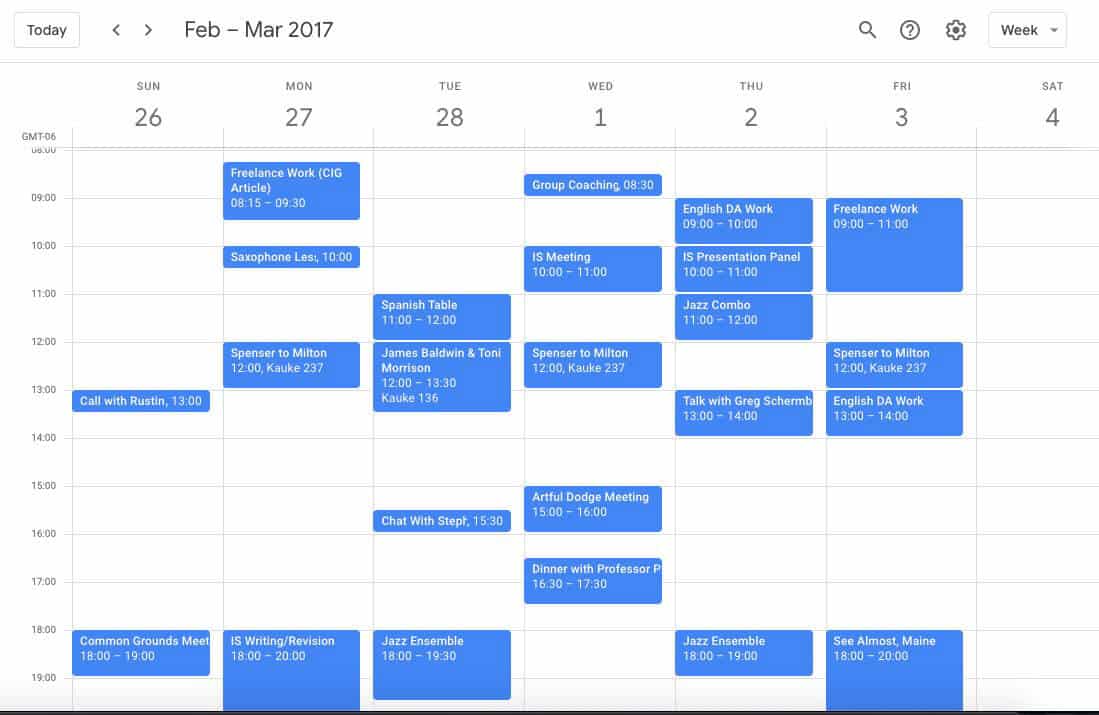
As you can see, I have all my classes blocked out. Not only did this make sure that I would never forget a class, but it also ensured that I would never schedule a meeting or other event during class time.
Note: If you’re using a digital calendar, I highly recommend you set your classes to repeat. This way, you’ll never forget when a class happens. Here’s how to create recurring events in Google Calendar.
You’ll also notice I have meetings, rehearsals, time for freelance work, and plenty of blank spots. I didn’t schedule my study time, as I was pretty good about getting that work done, but you could also include study blocks for particular classes if you want.
Of course, your calendar is just part of the equation.
How do you keep track of all the things you need to do on a daily basis?
How do you keep track of homework, tasks around your living space, and other goals you want to accomplish?
For this, you need a to-do list…
2. Your To-Do List/Task Manager
While having a calendar is the bare minimum for being organized, having a to-do list will really take things to the next level.
At first, you might wonder if a to-do list is even necessary at all. After all, can’t you just put all the things you have to do on your calendar?
While this method can work, it tends to fall apart if you have more than a couple things to do each day.
Plus, mixing your calendar and to-do list ignores the fact that each tool is better for different organizational tasks:
- Your calendar is for keeping track of events . That is, things that occur at a specific day and/or time that generally require you to physically be somewhere.
- Your to-do list, on the other hand, is for keeping track of tasks . Tasks are things you need to accomplish (sometimes on a specific day), but they generally don’t require you to be in a specific place or keep an appointment of some kind.
I realize the difference between events and tasks can sometimes be murky, so here are a few examples:
- A meeting with a professor
- A class you have to attend
- A music ensemble rehearsal
- Drafting an essay to bring to a meeting with a professor
- Completing a problem set for a class
- Learning how to play a piece of music for a rehearsal
How to Set Up a To-Do List
Now that you understand the difference, how do you actually set up a to-do list?
Again, you have a variety of options, and what you choose will depend if you want to use a digital or physical system.
On the digital side, we recommend Todoist . It’s free, intuitive, and easy to set up.
If you want a physical method, the bullet journal system is a great option. You can even create a hybrid digital-physical system, as Thomas discusses in this video:
But ultimately, it doesn’t matter what system you use. You could use a whiteboard or a blank notebook if you want. What matters is that you keep an updated list of the tasks you need to accomplish, as well as, you know, actually doing said tasks.
To make your to-do list, you should first create a brain dump of everything that you need to do on a regular basis. Here are some tasks that most college students need to do:
- Homework assignments
- Cleaning your dorm/apartment
- Preparing meals
- Club tasks (particularly if you’re an officer)
- Anything you’re learning outside of class
Next, you’ll need to put all of these tasks into your to-do list system. If you’re using a digital system, you can set certain tasks to recur (think “take out the trash” or “complete calculus problems for the day”). And then, as you think of new tasks, you can add them to your system.
Here’s an example of what my to-do list looked like in college:
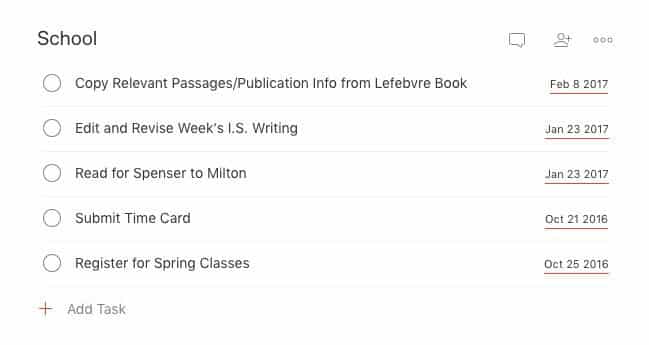
3. Your Notes
Taking good notes is key for comprehending and retaining any lectures or presentations that your professors give.
But taking notes on its own isn’t enough — to get the most value out of your notes, you need to keep them organized.
For some people, this could be as simple as having a different notebook for each class and referring back to it when you need to study for an exam.
While this can work, it’s not ideal. This is particularly true when you’re studying for a midterm or final and need to refer to weeks of notes.
To keep your notes extra organized, we recommend using a digital system such as Evernote . With Evernote, you can create a different digital “Notebook” for each class and type your notes there.
If you prefer to take notes by hand (which some studies indicate can help you better process information ), then you can also digitize your notes afterwards. To make this simple, just do it after all your classes are done for the day, before you start your homework.
When you use this system, you’ll be able to review material much more easily. You can even search for key terms and Evernote will help you find them in your notes, saving you the trouble of flipping back through a physical notebook.
4. Your Class Materials and Files (Digital and Physical)
In addition to your notes, each of your classes will likely have a syllabus, handouts, and presentations that you need to keep track of. You’ll also likely have assignments that the professor (or their grader) has returned to you, which can be valuable materials to review when you’re studying for an exam.
It’s key to keep all of these materials organized. Sure, you can probably get the syllabus, handouts, and PowerPoint presentations online. But that’s one extra step you have to go through when it comes time to study. Plus, you never know when the internet or school website might be down.
To be safe, I recommend you keep all of your class materials organized either in a physical three-ring binder or in some kind of digital system.
You could put all of the material in Evernote along with your notes, or you could have dedicated Google Drive folders for each class (other cloud sync apps like Dropbox and OneDrive work here as well, but Drive offers the best value for students unless you specifically need Microsoft Office).
Here’s an example of the Google Drive file system I used for my classes during the first semester of my junior year:
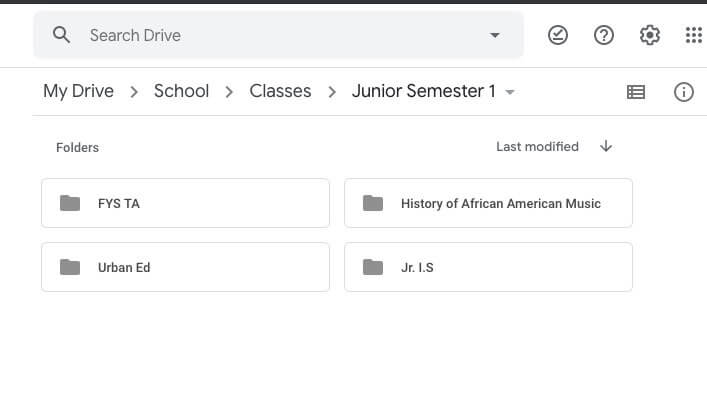
For extra redundancy, you could also keep folders on your computer with these materials in case the internet is down and you can’t access them.
Want more info on how to keep your files organized? Check out this guide Thomas created .
5. Your Backpack
We couldn’t talk about organization in college without discussing something that almost every student has: a backpack .
Even with an increasingly digital world, you still need to carry around your computer. And many classes will still have physical textbooks that you need to bring, as well as assignments that you have to complete on paper.
Your backpack (or briefcase or purse or whatever you use) is key for keeping all of these materials organized and at the ready.
Organizing your backpack isn’t hard — the key step is to remember to fill your backpack with the things you need for the day.
After all, there’s nothing worse than showing up in class, only to get that sinking feeling in your stomach as you realize that you don’t have the book or paper you need.
In some cases, not having the right materials could even hurt your participation grade, so organizing your backpack is something you must not overlook.
To make sure you bring everything to class, pack your bag the night before . This was the advice my mom gave me when I was in elementary school, and it still applied in college.
Packing the night before ensures that you don’t forget anything due to being in a hurry. And it also allows you a night of sleep to recall something you forgot.
If you’re really having trouble remembering to bring everything you need to class, you can add a task to your to-do list that says something like “Pack bag for [day of the week] classes.” Under this task, write a list of the things that you need to bring. This way, you can check off the items as you’re packing.
Here’s an example of what this would look like in Todoist:

Curious what should be in your backpack for college? Check out this list .
How to Stay Organized with Weekly Productivity Planning and Reviews
If you went through all the steps in the previous section, you should now have a system for keeping all aspects of your life organized. However, creating the organizational system is actually the easy part.
The challenge comes from keeping things organized. So in this section, I’ll show you two crucial habits that will help you maintain your organizational system:
- Weekly planning
- Weekly review
These two habits are complementary, and they take 30 minutes a week at most. Yet they can have a massive effect on whether or not you actually stay organized:
1. Review Your Previous Week
So you put your organizational system into place, and you now feel more motivated than ever.
However, what you’ll quickly realize is that real life isn’t as neat and precise as your beautiful to-do list and calendar.
Inevitably, unexpected things will come up that will prevent you from completing certain tasks or even attending certain events.
It’s tempting to get frustrated when things don’t go as planned, but it’s more effective to accept that this will happen and correct your system accordingly.
One of the best ways for dealing with unexpected changes or challenges to your organization is to create a weekly productivity review habit.
This 3-step process only takes a few minutes:
1. Compare what you planned to accomplish with what you actually accomplished.
We start each week with the best intentions, but then life happens.
You planned to spend an hour each day practicing integral calculus, but you only did that 3 days out of the week.
You signed up for a Thursday evening yoga class, but then you ended up having too much homework to attend.
You get the idea. The point is to look at the gap between what you planned and what actually happened.
2. Use this information to make changes to your system.
Recognizing the gap between your plans and accomplishments means nothing if you don’t use that information to inform your future plans.
Once you’ve identified what you didn’t accomplish, you need to examine why. Then, you can adjust what you plan for the coming week.
For instance, if you didn’t get in your hour of integral calculus practice each day, what prevented you?
You might realize that it was because you were studying in the student center and kept getting distracted by friends passing by. Recognizing this, you could plan to do your studying in the library basement, a place with no distractions except some dusty geological survey maps.
As you make this process a habit , you’ll get better about planning realistic goals and schedules. Which brings us to the next habit…
2. Plan Your Upcoming Week
Once you’ve reviewed the previous week, it’s time to plan for the week to come.
If you’re adjusting what you do based on the previous week, then you’re already on the right track. But in addition to reviewing the previous week, I recommend the following weekly planning steps:
1. Clean up your task management system and calendar.
During the course of the week, there will be tasks on your to-do list that you either forget to check off or just don’t do. Your calendar may also end up with stray events that are no longer relevant, or with things that you need to reschedule for the coming week.
When you’re planning the week to come, first make sure to clean out all the existing junk in your organizational systems.
Find new, realistic due dates for tasks you didn’t get to last week, and make note of any rescheduled events on your calendar. This could also extend to organizing any binders you have for class, securing loose papers, and digitizing any notes you haven’t gotten around to.
2. Plan for the week to come.
Once you’ve cleaned out everything from the previous week, you can turn your attention to the upcoming week.
To start, make a list of any upcoming tasks you can think of. I recommend looking at the syllabus for each of your classes, as well as any online systems that your professors use to post assignments. Then, transfer your tasks into your to-do list system.
Next, take a look at your calendar. See what events are coming for the week, and add anything that isn’t currently on your calendar. Check your syllabus for impending due dates, and review your work schedule to make sure it’s accurate.
Finally, make sure that your backpack is organized and packed for the following day. This will help you avoid forgetting an assignment or book you need to bring to class.
This weekly review and planning process may sound time-consuming when you read through it, but in reality, it should take no more than thirty minutes.
And if you do it every week, you’ll find that it takes you less and less time as you become more organized . To make sure that you go through the process each week, block off time for it on your calendar (man that just got meta).
Staying Organized Sets You Up for Success
This ended up being a massive guide, so here are the key takeaways for easy reference:
- Use Google Calendar (or another calendar app) to keep your events organized.
- Organize your task with a to-do list system such as Todoist .
- Digitize your notes for easier review.
- Keep your physical and digital class materials organized using a three-ring binder and Google Drive .
- Keep your backpack clean and stocked with the materials you need to bring to class.
- Take 30 minutes each week to review the previous week and plan the week to come.
And above all, don’t let your organizational system get in the way of what really matters: accomplishing the things you want to do .
The right organizational system will help you do the things you want without getting too stressed. But at the end of the day, you still have to sit down and do the work.
So go out there this semester and do something epic!
Need help staying organized while taking online classes? Check out this guide .

Higher Education News , Tips for Online Students
College 101: U.S. Colleges Explained
Updated: July 18, 2022
Published: February 11, 2020

Whether you’re a high school student looking to understand what college or university is all about, or you’re an international student looking to study abroad in the United States, American colleges can seem confusing. There are so many types of degrees, majors, and colleges to choose from. Plus, navigating course codes, credits, and financial aid can seem like you’re learning a whole new language. Just how does college work in the U.S. exactly? All the questions you have about college are answered here.
College is the next step of education after high school for most United States students. College is used interchangeably with the word university ( more on that here ). At United States colleges, there are several degree programs including associate degrees, bachelor’s degrees, master’s degrees and PhDs.
Photo by Tim Gouw on Unsplash
How does college work.
We know that the U.S. college system can be a bit confusing at times. With so many types of schools, ways to earn credits, and financial aid options, it’s no wonder that potential students end up scratching their heads from college websites.
Here’s our all inclusive list of how college works in the U.S.
Degrees and Credits
1. how many credits do i need for a bachelor’s degree.
For a bachelor’s degree, you need to complete 120 credits. Colleges also may have specific education requirements such as 1 math course, 1 English course, and 1 art course. Finally, each major has stipulations about how many credits of each type of course you may need.
2. What Level of Education Do You Need?
To find out what level of education you need, all you need to do is a bit of research. You may be able to get away with a bachelor’s degree now, but to reach your full career potential, a higher degree may be required.
3. What Are General Education Requirements?
General education requirements are what is required from your college or university in order to graduate. They are usually basic courses and you may have the flexibility to choose what you want to take within those gen ed requirements.
4. Bachelor’s of Arts vs. Bachelor’s of Science
A bachelor’s of arts requires more courses from humanities and arts departments, and bachelor’s of science will require more courses from science and math departments. To determine which is the best degree option for you, look at what field you are interested in, and what is commonly accepted or preferred when you will enter the workforce.
What is Dual Credit?
Dual credit is an option for students in high school in the United States to earn college credit and high school credit simultaneously. This can either happen at a high school, or at a local community college.
How Many Dual Credits Should You Take?
Too many dual credits that don’t ultimately work towards your degree will be a waste of time. Be smart about which dual credit classes you decide to take. Taking dual credits will save you from paying for college classes later on, but you may have to take introductory classes in college anyways. Also, before you get too excited signing up for several dual credits, check what is the maximum number of credits you are allowed to transfer into your college.
What’s the Difference Between AP and Dual Enrollment?
Advanced placement (AP) classes are classes for high school students meant to give them college credit after passing a test. At the end of the course, a student can take the test and depending on their score, they can get college credit for the class. The score is the credit, not the class. Students can take the test without taking any classes, but they might not pass.
Dual enrollment, on the other hand, is when high school students take college classes on college campuses during their junior or senior year of high school, and they earn dual credit at their high school.
When Transfer Credits Don’t Transfer
It isn’t uncommon for transfer students to complain that they have lost credit after their transfer. This can be due to the course not being advanced enough, or attempting to transfer duplicate courses. Check out what courses will apply to your new school before you transfer, to avoid loss of time and money.
Transfer Credit Without Losing Credit
You should check out transfer policies before enrollment, and make sure you are able to transfer a majority of your credits. Some colleges are more transfer-friendly than others. For example, some have a cap on the amount of credits they will receive.
Common Course Codes That Transfer
An easy way to check if your credits will transfer is to look at the 3-letter prefix and the numbers. Generally, business (BUS) will transfer to business, and communication (COM) will transfer to communication credits. There is not much wiggle room.
Commonly used number codes are more likely to transfer, such as 101, 201, 301, 100, 200, 300, etc. For example, Psych 101 is likely to transfer, while Graphic Arts 293 might not.
How to Transfer Community College Credits to University
Send your transcript to your new major advisor and ask them which credits will transfer. Sometimes the credits will transfer, but your past classes won’t substitute future classes. This is important to keep in mind when budgeting your time and money after the transfer.
Paying for College
Photo by caleb minear on unsplash, financial aid explained.
The FAFSA, or Free Application for Federal Student Aid, is an application that all U.S. citizens and residents with a green card are eligible to apply for. The application includes questions regarding your income, and your guardians’ income(s), if you are a dependent. Students only receive student financial aid if they are deemed by the U.S. Department of Education to be in financial need. They will then determine whether to hand the student loans or grants. Grants are very difficult to obtain, and federal loans each have different interest levels. Students need to reapply for financial aid every year that they are in school.
The 529 Plan
The 529 plan allows you to pre-pay for college years early. This is often done by parents who want to lock in lower rates before their kids go to school.
Student Debt is a Killer
College sets you ahead in your life in many ways, but one of the ways it sets you far back is financially. The average student debt is $37,172 . There are ways to avoid student debt though, or to be smart about paying it off. Don’t let the fear of student loan debt hold you back from going to college, but make smart financial choices and don’t take the loans lightly.
Things to Consider About Student Loans
Before you apply for a student loan, investigate ways to save on tuition so you can take out less loans. For example, maybe transfer credit is available. If you plan on working part time, you may be able to take out less loans and pay some of your tuition upfront as well.
Calculate your ROI
Before you choose a school or a degree program, look at the school and program’s return on investment. Look at starting salaries for majors you might choose, and if that brand name school is really worth the extra tuition.
College is Expensive, Here’s How to Save
College is expensive, but there are some ways to make is less so. Take full-time credits each semester, as taking part-time can make you ineligible for financial aid. Try not to switch majors as you’ll end up taking extra classes, and take advantage of alternative credit such as dual credits in high school and work-study opportunities.
Choosing a Major
To find out what you should major in, ask yourself the following questions:
1. What kind of lifestyle do you want?
2. What career paths interest you?
3. What experience and knowledge do you need to support your dreams after graduation?
Why Majors Don’t Matter
While majors can help you get certain specific knowledge, a major usually doesn’t matter too much for undergraduate studies. It is more important what you do with your time in college.
The STEM Majors
STEM combines all of its parts (science, technology, engineering, and mathematics) into one discipline to create a well-rounded field of study. STEM is much different than majoring in just one of those departments and can be much more challenging as well, as it offers a new way to learn and think.
A STEM major (as opposed to majoring in STEM), is to major in one of those four disciplines of science, technology, engineering and mathematics. Within each of these majors, there may be some overlap but not as much as majoring in STEM itself.
Highest Paying Majors
Across the board, the consistently highest-paying majors are in engineering (mechanical, industrial, materials, aerospace, systems, electrical, nuclear, chemical, computer, and petroleum). Other high-paying majors are in business and political science.
Most Common Majors
1. Accounting: Accountants aren’t just good at finance and math. They also must be highly organized and self-disciplined.
2. Liberal Arts Music: If you love music, why not get a degree in it? There are plenty of music careers where you can pursue your passion.
3. Marketing: Graduates with marketing degrees are in high demand, and this is a great area of business to enter.
4. Communications: This major is not just for those going into journalism, it can be the perfect major for you if you are considering a career of any kind.
5. English: English majors are excellent at writing, love literature and language and have a broad range of careers waiting for them at graduation.
Choosing a College
Photo by jasmine coro on unsplash, is this the best way for you to get an education.
Don’t just go to college because you think you should. Education comes in many forms, and college is only one of them. Do your research and find out if college is the best way to get you where you need to be.
What Every Dropout Should Know
Not going to college is a legitimate option, but know that you are taking a risk by dropping out of college. Remember that you can always go to college later in life, but it may be more difficult.
Should You Go to College?
This is a big question you should ask yourself before you enroll. Check out our full guide to find out if college is right for you.
How College Admission Works
Undergraduate college admissions are based on several factors: SAT scores, personal essays, high school grades/transcripts, and recommendation letters. Check deadlines far in advance to make sure you have enough time to take tests, ask for recommendation letters, and write your essays. Make sure to double check everything before you submit your application.
How Does College Accreditation Work?
What is accreditation .
Accreditation of higher education institutions is done by a private organization to ensure that the school meets acceptable levels of education quality.
The Involvement of the Department of Education
There is a U.S. law that states that any educational institution receiving financial aid must meet certain education quality criteria. This can often be proved through accreditation.
How Colleges and Universities Get Accredited
Getting accredited is optional and may take 1-2 years to show eligibility. Schools may show eligibility by submitting information on faculty, class syllabi, financial viability, graduation and degree requirements, and sample student work.
The Consequences of Attending a Non-Accredited School
When a student attends a non-accredited college or university, they may be ineligible for student aid, may not have credits transferred, other universities may not recognize the degree for further education, and a non-accredited degree may not be taken seriously by employers post-graduation.
How to Find out if an Online School is Accredited
Online schools should have accreditation information posted on their website. From there, you can look into the accreditation organization.
Accreditation Red Flags
Red flags for schools include having a similar name and logo to another university, few graduation requirements, promises completion in an unusually short time, and automatic acceptance.
Types of Colleges: The Basics
Photo by michael marsh on unsplash, community college: truth and fiction.
Check your facts. Common misconceptions about community colleges are that it is a stepping stone to university (it’s not!), your credits will definitely transfer, and that it will help you decide what to do next.
Don’t Waste Money on Community College
Community college isn’t guaranteed to save you money. But if you’re smart about it, you may be able to save big by attending a community college for general credits, then transferring to a large public school for your major. However, as some credits may not transfer, you may not be saving in the end.
Public, Private, and For-Profit Colleges
Public colleges are state funded and owned, while private colleges are funded by another organization, such as a religious institution. Some colleges are for-profit. This may mean higher tuition rates and sometimes credits may not transfer to other colleges.
Four-Year and Two-Year Colleges
Four-year colleges offer bachelor’s degrees and include liberal arts colleges and universities. Two-year colleges offer associate’s degrees and certificates and include community colleges, vocational, and technical schools.
Liberal Arts Colleges
Usually private, these colleges tend to focus on the arts and humanities, and are oftentimes smaller than universities.
Universities
Universities usually have a collection of smaller colleges and may offer graduate degree programs, and research programs as well.
Vocational, Technical, and Career Colleges
These kinds of colleges offer specialized training in a particular field and prepare students for entry into that field. Examples include healthcare management, medical assistance, food and beverage management, and office management.
Specialized Colleges
These are colleges that are for specific people or purposes and include:
- Arts Colleges
- Single-Sex Colleges
- Religiously Affiliated Colleges
- Specialized Mission Colleges
Your College Degree Options
- Associates Degree: 2 years
- Bachelor’s Degree: 4 years
- Graduate Degree: 1-4+ years
- Professional Degree: 3+ years
- Joint Degrees: Getting a bachelor’s degree that goes straight into a graduate degree
- Teacher Certification: 1 year
How Does Online College Work?
Photo by dan dimmock on unsplash, what is online college like.
Online college is very similar to on-campus college. They both offer the same coursework, materials, assignments, tests and deadlines. The difference is that online students may watch video lectures instead of in-person lectures.
What Does an Online Classroom Look Like?
For a live classroom, students may use a platform where they log on and can listen live while other online students listen as well, and in-class students are in person. Online college platforms typically include a discussion section, lectures, grades, and groups sections.
Is Online College Hard?
Online college is the same as traditional college in terms of its coursework, assignments, exams, and deadlines. So the course content and requirements is the same level of difficulty. However, online students need to be much more self-motivated and accountable for their grades and participation.
If you are looking for a flexible, fully online, and accredited American university, check out our degree programs from University of the People (UoPeople). Not only is University of the People an accredited online school, but it is also tuition-free! Meaning you’ll get the most value for your education given that the only fees charged are for assessments to help the operation of UoPeople to continue. Degrees offered include associate’s bachelor’s and master’s degrees in fields of Computer Science , Business , Education , and Health Sciences .
Hopefully, we’ve cleared up any confusion there was about U.S. colleges. How does college work? Now you know!
Related Articles

Ideas for Great Group Work
Many students, particularly if they are new to college, don’t like group assignments and projects. They might say they “work better by themselves” and be wary of irresponsible members of their group dragging down their grade. Or they may feel group projects take too much time and slow down the progression of the class. This blog post by a student— 5 Reasons I Hate Group Projects —might sound familiar to many faculty assigning in-class group work and longer-term projects in their courses.
We all recognize that learning how to work effectively in groups is an essential skill that will be used by students in practically every career in the private sector or academia. But, with the hesitancy of students towards group work and how it might impact their grade, how do we make group in-class work, assignments, or long-term projects beneficial and even exciting to students?
The methods and ideas in this post have been compiled from Duke faculty who we have consulted with as part of our work in Learning Innovation or have participated in one of our programs. Also included are ideas from colleagues at other universities with whom we have talked at conferences and other venues about group work practices in their own classrooms.
Have clear goals and purpose
Students want to know why they are being assigned certain kinds of work – how it fits into the larger goals of the class and the overall assessment of their performance in the course. Make sure you explain your goals for assigning in-class group work or projects in the course. You may wish to share:
- Information on the importance of developing skills in group work and how this benefits the students in the topics presented in the course.
- Examples of how this type of group work will be used in the discipline outside of the classroom.
- How the assignment or project benefits from multiple perspectives or dividing the work among more than one person.
Some faculty give students the option to come to a consensus on the specifics of how group work will count in the course, within certain parameters. This can help students feel they have some control over their own learning process and and can put less emphasis on grades and more on the importance of learning the skills of working in groups.
Choose the right assignment
Some in-class activities, short assignments or projects are not suitable for working in groups. To ensure student success, choose the right class activity or assignment for groups.
- Would the workload of the project or activity require more than one person to finish it properly?
- Is this something where multiple perspectives create a greater whole?
- Does this draw on knowledge and skills that are spread out among the students?
- Will the group process used in the activity or project give students a tangible benefit to learning in and engagement with the course?
Help students learn the skills of working in groups
Students in your course may have never been asked to work in groups before. If they have worked in groups in previous courses, they may have had bad experiences that color their reaction to group work in your course. They may have never had the resources and support to make group assignments and projects a compelling experience.
One of the most important things you can do as an instructor is to consider all of the skills that go into working in groups and to design your activities and assignments with an eye towards developing those skills.
In a group assignment, students may be asked to break down a project into steps, plan strategy, organize their time, and coordinate efforts in the context of a group of people they may have never met before.
Consider these ideas to help your students learn group work skills in your course.
- Give a short survey to your class about their previous work in groups to gauge areas where they might need help: ask about what they liked best and least about group work, dynamics of groups they have worked in, time management, communication skills or other areas important in the assignment you are designing.
- Allow time in class for students in groups to get to know each other. This can be a simple as brief introductions, an in-class active learning activity or the drafting of a team charter.
- Based on the activity you are designing and the skills that would be involved in working as a group, assemble some links to web resources that students can draw on for more information, such as sites that explain how to delegate and share responsibilities, conflict resolution, or planning a project and time management. You can also address these issues in class with the students.
- Have a plan for clarifying questions or possible problems that may emerge with an assignment or project. Are there ways you can ask questions or get draft material to spot areas where students are having difficulty understanding the assignment or having difficulty with group dynamics that might impact the work later?
Designing the assignment or project
The actual design of the class activity or project can help the students transition into group work processes and gain confidence with the skills involved in group dynamics. When designing your assignment, consider these ideas.
- Break the assignment down into steps or stages to help students become familiar with the process of planning the project as a group.
- Suggest roles for participants in each group to encourage building expertise and expertise and to illustrate ways to divide responsibility for the work.
- Use interim drafts for longer projects to help students manage their time and goals and spot early problems with group projects.
- Limit their resources (such as giving them material to work with or certain subsets of information) to encourage more close cooperation.
- Encourage diversity in groups to spread experience and skill levels and to get students to work with colleagues in the course who they may not know.
Promote individual responsibility
Students always worry about how the performance of other students in a group project might impact their grade. A way to allay those fears is to build individual responsibility into both the course grade and the logistics of group work.
- Build “slack days” into the course. Allow a prearranged number of days when individuals can step away from group work to focus on other classes or campus events. Individual students claim “slack days” in advance, informing both the members of their group and the instructor. Encourage students to work out how the group members will deal with conflicting dates if more than one student in a group wants to claim the same dates.
- Combine a group grade with an individual grade for independent write-ups, journal entries, and reflections.
- Have students assess their fellow group members. Teammates is an online application that can automate this process.
- If you are having students assume roles in group class activities and projects, have them change roles in different parts of the class or project so that one student isn’t “stuck” doing one task for the group.
Gather feedback
To improve your group class activities and assignments, gather reflective feedback from students on what is and isn’t working. You can also share good feedback with future classes to help them understand the value of the activities they’re working on in groups.
- For in-class activities, have students jot down thoughts at the end of class on a notecard for you to review.
- At the end of a larger project, or at key points when you have them submit drafts, ask the students for an “assignment wrapper”—a short reflection on the assignment or short answers to a series of questions.
Further resources
Information for faculty
Best practices for designing group projects (Eberly Center, Carnegie Mellon)
Building Teamwork Process Skills in Students (Shannon Ciston, UC Berkeley)
Working with Student Teams (Bart Pursel, Penn State)
Barkley, E.F., Cross, K.P., and Major, C.H. (2005). Collaborative learning techniques: A handbook for college faculty. San Francisco: Jossey-Bass.
Johnson, D.W., Johnson, R., & Smith, K. (1998). Active learning: Cooperation in the college classroom. Edina, MN: Interaction Book Company.
Thompson, L.L. (2004). Making the team: A guide for managers. Upper Saddle River, NJ: Pearson Education Inc.
Information for students
10 tips for working effectively in groups (Vancouver Island University Learning Matters)
Teamwork skills: being an effective group member (University of Waterloo Centre for Teaching Excellence)
5 ways to survive a group project in college (HBCU Lifestyle)
Group project tips for online courses (Drexel Online)
Group Writing (Writing Center at UNC-Chapel Hill)
Colleges Rates and Requirements
Find the right college for you., core college requirements for competitive acceptance rates.
As you start thinking about which colleges to apply to and how to put together your college applications, don’t forget to familiarize yourself with current admissions requirements and acceptance trends. You may have seen recent headlines about college acceptance rates and how low they were for students who applied to the most selective colleges and universities. It’s important to remember that while admissions requirements for the most competitive schools didn’t change, the number of students applying to these types of institutions has gradually increased. As a result, acceptance rates of colleges, particularly elite universities, decreased. You should also keep in mind that due to the covid-19 pandemic, most institutions saw a spike in applications. This has caused acceptance rates to further decrease.
The headlines shouldn’t deter you from moving ahead with the application process. Although it might feel seem like there’s more competition than ever before, it’s important to remember two things: Acceptance rates vary among colleges, and most colleges accept two-thirds of applicants. Once you understand what college entrance requirements are and how to interpret college admission rates, you'll be better prepared to find the right school for you.
Understand These Key Requirements for College Applications.
Each college uses its own formula when evaluating applicants, and these practices vary from school to school. In addition, many colleges over the last few years have begun instituting "test optional" and "test flexible" policies for the SAT and ACT. Despite these factors, colleges still look for certain key requirements. You can learn more about admissions requirements for individual colleges in College Search .
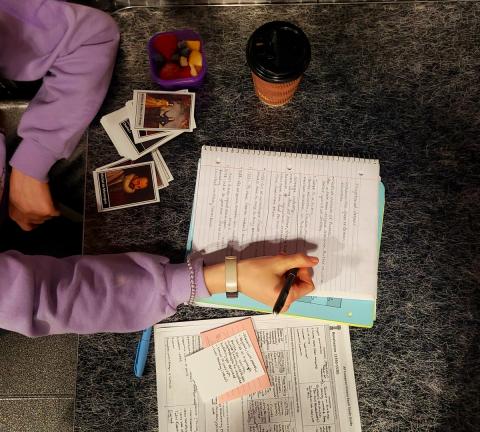
Standard Core Curriculum and Beyond
All colleges emphasize GPA requirements, but they focus particularly on performance in core subject areas such as mathematics, science, English, and history. Colleges look at your grades, curriculum, and the courses you take as indicators of your ability to be successful in college. To get a better understanding of which colleges might be the best fit for you, research the GPA requirements for colleges you’re interested in. Also look at the range of GPAs accepted at those institutions on the BigFuture College Search tool. Consider taking more advanced coursework such as AP courses if it fits with your career goals and if your school offers them.
Extracurriculars
Extracurriculars are where you can really stand out, especially from others with similar grades. Extra academic activities show off your personal strengths and interests to admissions officers. Ideally, they want to see students who were deeply involved in school activities outside of the classroom and held leadership positions. Learn more about how extracurriculars matter to you and colleges .
Application Essay
For colleges that require it, the application essay can be a very important part of your application and is your pitch to the university. This is your opportunity to show the school of your dreams the unique individual you are, something that may not necessarily be conveyed in your transcript. It indicates how your talents will contribute to their community. Find tips for writing your college essay here.
Standardized Test Scores
Though the trend in some U.S. colleges has been to put less emphasis on SAT scores, make no mistake: They still play an important role in the college admissions process. Test scores are still used by many colleges for course placement and merit aid. High test scores can also help you stand out and strengthen your college application. If you’re not sure if you should submit your scores, talk to your school counselor or the college’s admissions officer for guidance.
Letters of Recommendation
Although not required by all colleges, letters of recommendation can give admissions counselors insight into who you are beyond just your grades and activities. If letters are required by the institutions you’re applying to, the college will let you know who they want letters from. It’s usually a teacher or counselor. Pick someone who knows you well.
Keep on Top of College Application Deadlines.
Application deadlines can sneak up on high school seniors like a tiger in the night. It’s of utmost importance that you double-check your prospective school’s application deadlines and submit everything you need sooner rather than later. Most college application deadlines fall into the following categories:
Understand the College Application Platform.
There are two main types of college applications : The Common Application and the Coalition Application, which allow students to apply to multiple schools using a single application platform. You should check with the institutions you’re interested in applying to see which application platform they prefer.
How Do College Acceptance Rates Work?
A college’s acceptance rate is actually a ratio. It's the total number of applicants in relation to the number of students who were accepted. For example, Harvard received applications from 61,220 students in 2022─the highest-ever number of applicants to the school. Of those, only 1,214 received admission, leading to the school’s lowest-ever acceptance rate of 3.19%.
This illustrates the point earlier that college acceptance rates are on a decline as the number of applicants increases, saturating the pool with more competition than ever before.
Acceptance rates are based on the number of spots available at a college. This is a set number of applicants who can be admitted to that class of graduates, and it's not subject to change based on the volume of applicants. As you can imagine, more competitive schools, such as Ivy League colleges and universities, have fewer spots available and are thus affected more by the number of applicants.
This same logic applies to private and public colleges. Public colleges, which are characteristically larger institutions, will admit greater numbers of students, leading to higher acceptance rates. However, public colleges have also been impacted by a larger number of applicants. When you’re building your college list, it’s advisable to include a balance of reach, match, and safety schools to improve your chances of acceptance.
It's important to keep in mind that college admission rates don’t necessarily reflect the quality of education or the quality of students who apply, and you shouldn’t be discouraged from applying to schools based on these numbers.
What is the Difference Between Admission Yield and Enrollment Rate?
Admission yield is the percentage of students who accepted enrollment into a college after being granted admission. These vary significantly from school to school. For example, the University of California, Berkeley’s yield rate for 2022 was just 40% while the yield rate for Yale was a whopping 83%.
As students apply to greater numbers of colleges and have more options, yield rates decline.
Review the Latest College Acceptance Rate Stats.
Students faced competitive acceptance rates in 2022. Common Application public colleges and universities saw a 24% surge of applicants since 2019-20 and 17% for private institutions. Meanwhile, the acceptance rates continue to decline. For example, Emory University’s acceptance rate fell 8 percentage points between 2020 and 2022.
Students who are eyeing colleges with highly competitive acceptance rates must focus more than ever on the things that will set them apart: exceptional performance beyond the standard core curriculum, strong extracurricular participation, powerful application essays, letters of recommendation, and excellent standardized test scores. However, even with all of these differentiators, it’s important to remember that none of these can guarantee acceptance, especially at selective institutions. Be sure to build a balanced college list that gives you options.
Related Articles
- CBSSports.com
- Fanatics Sportsbook
- CBS Sports Home
- Masters Live
- Champions League
- Motor Sports
- High School
- Horse Racing
Men's Brackets
Women's Brackets
Fantasy Baseball
Fantasy football, football pick'em, college pick'em, fantasy basketball, fantasy hockey, franchise games, 24/7 sports news network.
- CBS Sports Golazo Network
- PGA Tour on CBS
- UEFA Champions League
- UEFA Europa League
- Italian Serie A
- Watch CBS Sports Network
- TV Shows & Listings
The Early Edge
A Daily SportsLine Betting Podcast
With the First Pick
NFL Draft is coming up!
- Podcasts Home
- The First Cut Golf
- Beyond the Arc
- Eye On College Basketball
- NFL Pick Six
- Cover 3 College Football
- Fantasy Football Today
- My Teams Organize / See All Teams Help Account Settings Log Out
College football spring games takeaways: Alabama has work ahead, Ohio State's defense steals the show
Scanning the country for the biggest takeaways as top college football teams held spring games on saturday.
During a loaded Saturday of college football spring games, Alabama's "A-Day" showcase took center stage. The Crimson Tide wrapped their first spring practice in almost two decades without legendary coach Nick Saban running the show as new boss Kalen DeBoer made his debut inside Bryant-Denny Stadium.
DeBoer unveiled his electric, high-flying offense -- the same that propelled Washington to a College Football Playoff National Championship appearance -- and a new-look defense helmed by former South Alabama coach Kane Wommack. While Saturday's spring game didn't lack in exciting moments, there's still plenty of work to be done before DeBoer can feel comfortable about the transition.
In particular, the defense raised some early concerns. The line of scrimmage, often a staple under Saban, got pushed around at the point of attack and allowed Alabama's running backs to collect three straight touchdowns on the first three offensive drives. The Crimson Tide's secondary, which is in the process of replacing four starters, gave up a plethora of big plays and looked disjointed at times.
Quarterback Jalen Milroe got off to a hot start but faded as the game wore on, dealing with the same inconsistency that plagued him last season and expressing visible frustration amid a late streak of three-and-outs. Of course, it makes sense that things are still a work in progress -- this is just DeBoer's third month on the biggest job of them all -- and Saturday gave plenty of reason for optimism.
Despite his inconsistency, it's clear that Milroe worked hard on improving his throwing motion during the offseason. That will pay dividends as the calendar turns to the fall, and he already looked quite comfortable in DeBoer's big-play offensive system. The defense looked better as the game wore on with some young defensive backs making plays and standing out in a room that so desperately needs help.
Overall, it's hard to glean too much from a spring game.
Let's have a look now at some more takeaways from several notable spring games that took place across the country on Saturday.
Ohio State's defense steals the show
Ohio State's seismic changes on the offensive side of the ball, which included hiring sitting UCLA coach Chip Kelly as offensive coordinator, dominated the offseason news cycle. But once the 2024 Buckeyes took the field for the first time in Saturday's spring game, it was the defense that stole the show. Ohio State's combined offenses managed just four touchdown possessions all game despite an inflated 34-33 final score; defensive coordinator Jim Knowles' unit did a great job of controlling tempo and limiting explosive plays.
The secondary, in particular, looked very impressive. Going up against one of the deepest and most talented wide receiver rooms in the country, the Buckeyes' defensive backs allowed a combined 357 yards and one touchdown to Ohio State's four quarterbacks while logging four interceptions. Starting cornerbacks Denzel Burke and Jordan Hancock more than held their own against the likes of Emeka Egbuka, Carnell Tate and ballyhooed freshman Jeremiah Smith. In fact, Burke and Hancock largely dominated. It was another sign of tremendous progress for a group of defenders that has steadily improved under Knowles. This season could be their time to finally ascend into that elite tier.
Florida has plenty of hope in the future
Make no mistake: Florida's offense belongs to Graham Mertz. After a very solid 2023 season, the veteran quarterback looked right at home operating the Gators' offense in the spring game. He finished with a solid statline, completing 15 of 27 passes for 243 yards and one touchdown. Though he had an interception, Mertz was comfortable working every level of the field and his veteran presence should pay dividends for an offense that's breaking in a lot of new players elsewhere.
Still, it's really hard not to get excited about DJ Lagway. The No. 1 quarterback in the class of 2024 enrolled at Florida early and made his debut in front of fans Saturday, playing opposite Mertz on the Orange team. Standing at 6-foot-3 and 241 pounds, Lagway cut an impressive figure before he even threw a pass. He got to flash enticing versatility on his very first drive, moving the ball through the air and with his legs before capping things off with a 22-yard dart to wide receiver Aidan Mizell for a touchdown. Lagway had another impressive touchdown throw later, and despite an interception of his own, flashed the tremendous potential that had recruiting analysts buzzing. There's tons of hope for Florida's offensive future so long as Lagway is in a Gators uniform.
LSU looking at a smooth transition
Not to say that Garrett Nussmeier is going to have a Heisman Trophy-caliber season -- it's obviously very hard to reach that echelon -- but LSU seems to be in good hands following Jayden Daniels' departure. The Nuss Bus was firing on all cylinders in LSU's spring game and had a near flawless performance, completing all seven of his passes for 187 yards and two touchdowns. He led all quarterbacks in yards and touchdowns despite attempting the third-most passes among the four signal callers that touched the ball. He averaged almost 27 yards per pass, and his two touchdown passes covered 45 and 59 yards, respectively. With how comfortable Nussmeier looked given his relative lack of experience, it seems fair to expect big things from him in the fall. Certainly a name on which to keep tabs.
Utah's offense should easily transition to Big 12
Cam Rising is most certainly back. The now seventh-year senior missed all of the 2023 season while recovering from a knee injury and made his return to Rice-Eccles Stadium Saturday, completing 15 of his 19 pass attempts for 208 yards and two touchdowns. He showed excellent rapport with USC wide receiver transfer Dorian Singer, who caught almost everything in his vicinity and finished with 92 yards receiving. Money Parks flashed his big-play ability with a 57-yard receiving touchdown. When tight end Brant Kuithe, who did have a short catch, is back to full health, Utah will have an offensive unit that stacks up against any in a Big 12 Conference that's renowned for offensive fireworks. If Saturday was any indication, the Utes will be right at home in their new stomping ground.
Saban back in Bryant-Denny
He may have stepped away from coaching, but it's going to be hard to keep Nick Saban away from Tuscaloosa. Not that anyone would want to -- he is keeping an office in the athletic complex, after all. But ahead of kickoff for Saturday's A-Day, Saban was back on the field with his wife, Terry, to take in the pre-game festivities. He and Terry were also shown on Alabama's jumbotron, which drew a big ovation from fans packed inside the stadium.
New era underway in Tuscaloosa
Saturday is, obviously, a huge day for Alabama. It will be the first time in almost two decades that a coach not named Nick Saban will be leading the Crimson Tide onto the field inside Bryant-Denny Stadium on a full-time basis. With A-Day about to kick off, the Kalen DeBoer era is officially underway. He obviously has big shoes to feel, and the spring game will be an enticing pick at how he's going to operate compared to his predecessor. With players like quarterback Jalen Milroe coming back, the Crimson Tide are in a good position to compete for the College Football Playoff -- a position that DeBoer is comfortable with given his run as the coach at Washington in 2023.
Lovett caps big day with stellar TD catch
Georgia could boast one of the nation's most potent QB-WR duos as it looks to make it back to the College Football Playoff. Former Missouri transfer Dominic Lovett, who's in his second year with the Bulldogs, had a huge day in Georgia's spring game and capped it with one of the best touchdown catches you'll see before the actual season begins. With the clock winding down in the fourth quarter, quarterback Carson Beck lofted a pass to the corner of the end zone. With a defensive back draped all over him, Lovett caught the ball -- pinning it against the defender's back -- and maintained possession as he slammed into the fence around the field.
That put a bow on a 7-catch, 104-yard day for Lovett in regulation, who unquestionably looked like Georgia's top offensive playmaker.
Petrino's offense clicking
Bobby Petrino's return to Arkansas is going about as well as anyone could expect thus far. Despite the loss of major starts like KJ Jefferson and Raheim Sanders, the first-team offense managed to score on four of its first five drives. Jefferson's replacement, Boise State transfer quarterback Taylen Green, looked smooth and comfortable operating Petrino's system, tossing two pinpoint passing touchdowns. Utah running back transfer Ja'Quinden Jackson, who's likely stepping in to replace a lot of Sanders' production, posted two rushing touchdowns and one receiving touchdown of his own.
Nuss Bus rolling early
No Jayden Daniels, no problem for LSU. Okay, it might be a little early to say that -- it's never easy to replace a Heisman Trophy winner, after all -- but LSU seems to be in good hands with Garrett Nussmeier. Looks like he's keeping momentum rolling from last season's ReliaQuest Bowl. LSU's staff certainly wasn't afraid to let him rip the ball during the first drive in LSU's spring game. He uncorked several deep balls in the first few plays and led the Tigers right down the field. On second-and-5 from the 45-yard line, Nussmeier stepped up into the pocket and threw a pass, across his body, while still in motion that floated all the way down to the goal line, where wide receiver Zavion Thomas was waiting wide open. It was an impressive throw that displayed Nussmeier's huge arm and fluid mechanics, even with an unstable platform.
Cam Rising back in force
Utah has high hopes as it moves to the Big 12 Conference in 2024, but a lot of that relies on the health of seventh-year quarterback Cam Rising. Rising missed all of the 2023 season due to a devastating knee injury that he suffered in the 2022 Rose Bowl, and Saturday marks his first time suiting up in well over a year. If the early returns are any indication, it doesn't look like he's lost a step. He finished his first two drives of action by completing 10 of his 12 passes for 147 yards and two touchdowns, both of which were very impressive throws to wide receiver Money Parks. Rising showed good mobility in rolling out of the pocket to make the first 2-yard connection, and he showcased the arm talent while hitting Parks in stride for a 57-yard score on the second throw.
As an extra treat for Utah fans, tight end Brant Kuithe -- who also sat out in 2023 with a knee injury -- was out on the field and caught a short pass from Rising to convert on fourth down late in the first quarter.
Lagway makes an early impression
It didn't take long for Florida freshman quarterback DJ Lagway to leave a mark on his team's spring game. He entered late in the first quarter and made an immediate impression with his legs, scrambling for a gain of seven yards early on to extend the drive. Florida's offense worked the ball just near the red zone, where Lagway roped a throw to wide receiver Aidan Mizell, in very tight coverage, for a 22-yard touchdown. It was an impressive throw for a true freshman, who led the receiver in a tight window. That allowed Mizell to catch it in stride and easily finish the play for the score.
Defense dominant early for Ohio State
Although Ohio State's offense has generated plenty of buzz due to an offseason filled with new additions and several moving parts, it is the defense that has stolen the day thus far during the spring game. That should come as no surprise. The Buckeyes return an overwhelming amount of talent on that side of the ball, including future NFL guys like defensive linemen JT Tuimoloau and cornerback Denzel Burke. The Buckeyes defense held the offense to just one touchdown during the first 30 minutes of play.
Perhaps an encouraging sign for fans, given the level of talent they have to face on a daily basis, is the fact that Ohio State's secondary looked lockdown. Burkes and veteran running mate Jordan Hancock more than held their own against the likes of Emeka Egbuka, Carnell Tate and Jeremiah Smith. Defensive backs were active on the ball, as well. Sophomore Calvin Simpson-Hunt and true freshman Jaylen McClain each had an interception, the latter of which likely would have been returned for a touchdown if it wasn't blown dead early into his return. Ohio State's defense took great strides in 2023 and early indications are that it could take that step into the elite tier in 2024.
Egbuka wows with one-handed snag
There's plenty of attention on Ohio State's future at wide receiver, with tons of fanfare around true freshman Jeremiah Smith, but fourth-year senior Emeka Egbuka just took one play to casually remind fans that he's one of the best at his position in the nation. Midway through the second quarter, Egbuka ran a route towards the sideline as quarterback Will Howard rolled out of the pocket. Howard lofted the ball to Egbuka between two defenders, and Egbuka effortlessly jumped into the air and snagged the pass with one hand before stepping out of bounds.
Chip Kelly already endearing himself to Ohio State
Ohio State opened Saturday's game with a wrinkle and a nod: the offense, now led by coordinator Chip Kelly, took the first snap, under center, with two running backs in the T-formation. According to coach Ryan Day, it was a nod to legendary Buckeyes coach Woody Hayes and the offensive system that he ran during his time with the program. According to Day, it was all Kelly's idea, and the team even studied old Woody Hayes film in the week leading up to the spring game.
A lot of debuts for Ohio State
Ohio State's spring game certainly brings plenty of intrigue during the early window. There are tons of fresh new faces taking the field inside Ohio Stadium for the first time. The newcomers are headlined by offensive coordinator Chip Kelly, who left his sitting position as UCLA's coach to join Ryan Day's staff. He'll call plays for Kansas State transfer quarterback Will Howard, who's taking the field first for Ohio State's offense. Another transfer in former Ole Miss running back Quinshon Judkins, who fits Kelly's offense perfectly, should get tons of shine. Plenty of eyes will also be on freshman wide receiver Jeremiah Smith, who signed with the Buckeyes as the No. 1 prospect in the 2024 class. Smith will have a lot of opportunity to play early given what the Buckeyes have to replace at the receiver position.
Alabama, LSU among teams with looming transfer needs
Spring games give coaches one final opportunity to evaluate their rosters before summer workouts transition into fall camp. With the spring transfer window looming in April, staffs will have to look at any remaining needs now that the first transfer phase and both high school signing periods have passed. Most rosters are all but set at this point, and if a team is still seeking a complete overhaul ... well, they're probably in trouble. But there are some prominent teams that have specific areas of need.

Big day for Alabama
Saturday's spring game begins one of the most pivotal seasons in modern Alabama football history as the Crimson Tide look to defend their place as one of the premier programs in the sport without Nick Saban, arguably the greatest coach in the sport's history. Kalen DeBoer understood the gravity of following in Saban's wake, or he would not have accepted the job after leading Washington all the way to the College Football Playoff National Championship in 2023. The annual A-Day scrimmage provides our first look at how DeBoer's team and program might look similar, and also different, to the Alabama teams of year's past.
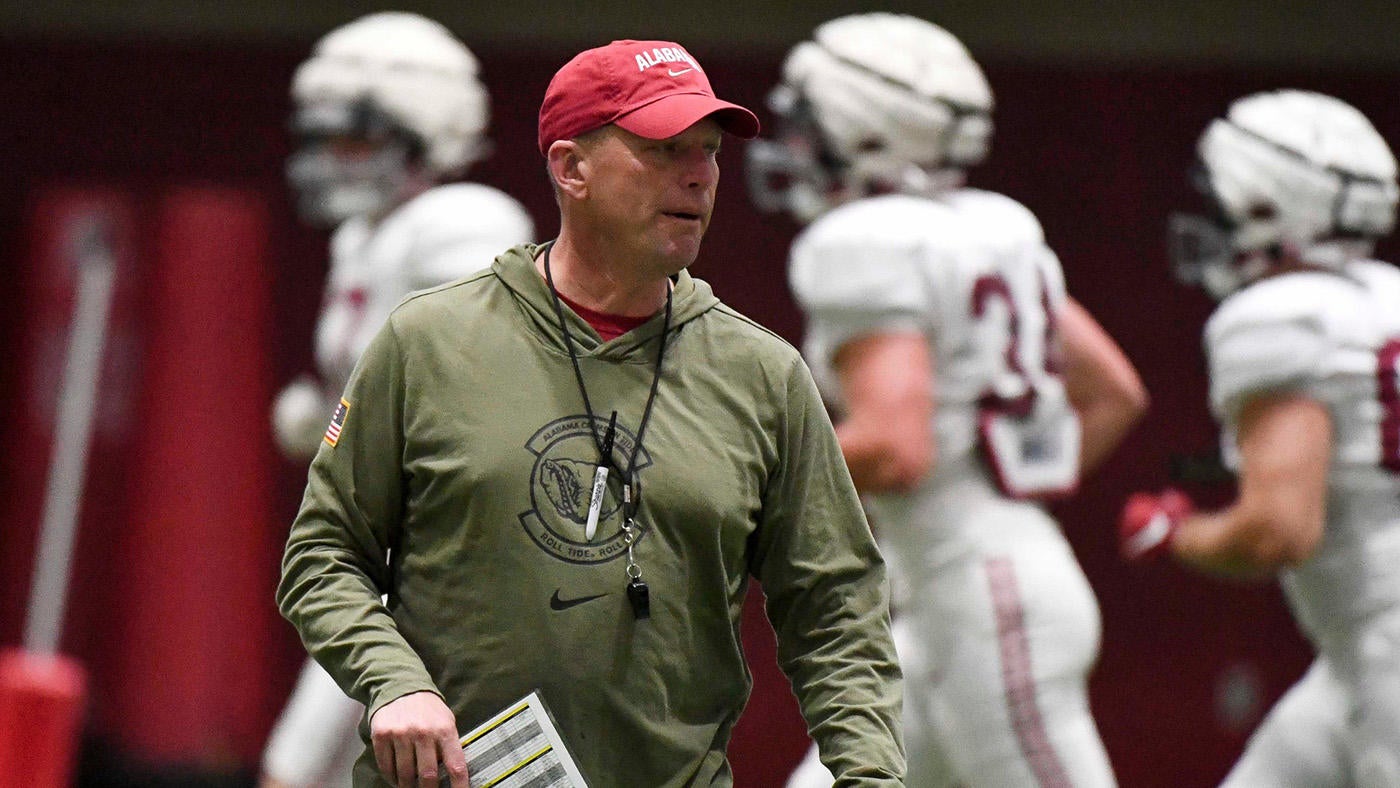
Who faces more pressure?
wo teams stand above the rest of college football entering the 2024 season with a strong case to rank No. 1 in the preseason polls. Both Ohio State and Georgia play spring games on Saturday with major focus on their programs.
Georgia's quest for a three-peat fell short in last season's SEC Championship Game, but the Bulldogs exorcised those demons with a 63-3 evisceration of Florida State in the Orange Bowl. A handful of key playmakers are off to the NFL, but Georgia is focused on setting the tone for 2024 despite missing out on a trip to the national championship.
Conversely, Ohio State limped into the offseason after an embarrassing 14-3 loss to Missouri in the Cotton Bowl. In response, coach Ryan Day quickly set his eyes on the most important offseason of his career. His strategy will decide everything.
With both programs facing pivotal offseasons, which program faces the most pressure in 2024?
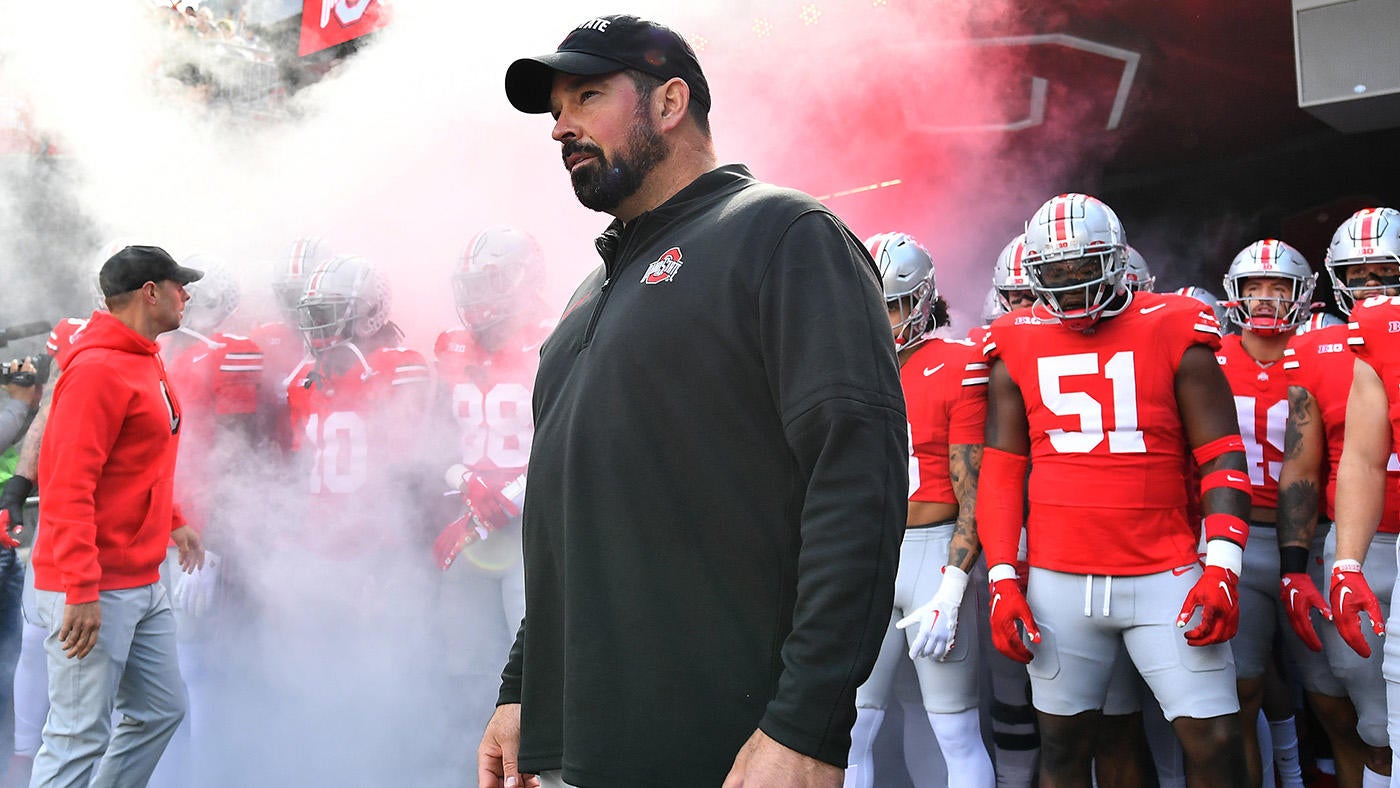
Saturday's spring game primer
It is officially spring game season, and the first major slate kicks off this weekend with showcases around the nation. Saturday is a big day for the SEC, in particular, with eight of its now 16 teams hitting the field to bring their spring practice sessions to an end.
That includes Alabama, which underwent a coaching transition for the first time in more than 15 years, and Georgia, which is looking to make it back to the College Football Playoff after its three-peat quest fell short last season. LSU is breaking in a new quarterback now that Heisman Trophy winner Jayden Daniels is off to the NFL.
Here's a look at some of the top storylines to keep track of during this weekend's spring games, as well as a rundown of the other notable teams in action on Saturday.

CBS Sports HQ Newsletter
We bring sports news that matters to your inbox, to help you stay informed and get a winning edge., thanks for signing up, keep an eye on your inbox., there was an error processing your subscription., share video.

Drew Allar Enters 2nd Season Under Center For Penn State

Looking Back At O.J. Simpson's Career At USC
Looking back at o.j. simpsons career at usc.

Alabama Begins Life Without Nick Saban

LSU Will Look To Replace Jayden Daniels, Top Two WRs In 2024

Ole Miss Boasting Top Transfer Class For 2024

Ohio State Gets First Look at Transfer QB Will Howard

Dueling Mock Drafts: Brock Bowers Climbs Into Danny's Top 10

Dueling Mock Drafts: Michael Penix Jr. Outside Danny's Top 20

Dueling Mock Drafts: Laiatu Latu Drops Out Of Brady's 1st Round

Dueling Mock Drafts: Malik Nabers Or Marvin Harrison Jr. For Top WR

Dueling Mock Drafts: Jayden Daniels vs. Drake Maye For No. 2 Pick
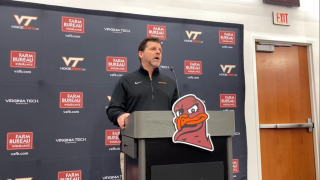
Virginia Tech closes out Phase I, ready for Phase II

Penn State All-Big Ten LB Abdul Carter's Move To DE Was His Call

Carolina Football Mindset Must Change in 2024

Latest intel on Alabama recruiting | Football Recruiting Podcast

Alabama and Kalen DeBoer heating up on the trail | Football Recruiting Podcast

Breaking down 4-star LB Darrell Johnson | Football Recruiting Podcast

Where does 4-star WR Derick Smith fit at Alabama | Football Recruiting Podcast

Derick Smith is a raw and versatile talent | Football Recruiting Podcast

COMMENTS
Here are some practical tips that will keep your work focused and effective: - Critical thinking - Academic writing has to be characterized by critical thinking, not only to provide the work with the needed level, but also because it takes part in the final mark. - Continuity of ideas - When you get to the middle of assignment, things ...
You finish one episode, then decide to watch another even though you've got SAT studying to do. It's just more fun to watch people make scones. D. Start the episode, but only catch bits and pieces of it because you're reading Twitter, cleaning out your backpack, and eating a snack at the same time. 5.
To start an assignment, try working on the most enjoyable or easiest parts of the assignment first to get the ball rolling. Even if no part of the assignment seems enjoyable or easy, set a timer and try to make yourself work for at least 5 minutes, which is usually enough time to build momentum and overcome procrastination.
Using the average given above, let's say that a student does 9 hours of homework per week per class. A typical semester would involve 5 different classes (each with 3 units), which means that a student would be doing an average of 45 hours of homework per week. That would equal to around 6 hours of homework a day, including weekends.
What this handout is about. The first step in any successful college writing venture is reading the assignment. While this sounds like a simple task, it can be a tough one. This handout will help you unravel your assignment and begin to craft an effective response. Much of the following advice will involve translating typical assignment terms ...
6. Set an Alarm. Not just any alarm. One programmed to tell you what you need to do and how it will impact your day. Think, "start working on your paper now and you'll be able to go to a movie.". If you ignore that one, then set another saying, "if you start your paper now, you can watch an hourlong drama," and so on.
Use Your Resources. Use class and other resources to help make doing your homework more productive and efficient. You might, for example, think that you don't need to go to class because the professor only covers what's already been addressed in the reading. Not true. You should always go to class -- for a variety of reasons -- and doing so can ...
Share. Since coming to Harvard, I don't recall even once hearing the word "homework"—which is a pretty strange thing considering the role it played for the first 12 years of my education (spoiler alert: this doesn't mean that we don't have assignments and work to do). However, the type of work that's assigned in college is ...
The number of assignments you will receive in a semester often surprises students. For some students, figuring out how to manage assignments is a new experience. For others who have had assignments in the past, the amount of work needed to complete assignments at the college level is what is unexpected.
Create A Plan And Work Schedule. Once you have a good understanding of the task at hand and what's expected of you, it's time to create a plan. This should be a detailed document that outlines everything you need to do in order to complete the assignment to a high standard. Your plan should include a timeline and deadlines for each task, as ...
Forming a study group is another way to reduce procrastination and better prepare for your exams. 8.) Take breaks. The final and most important tip is to make sure you fit in some time to relax among all the hustle and bustle of college. Taking short breaks between assignments can be a great way to avoid burnout.
4. Avoid Burnout at All Costs. The most important thing you can do to keep up with your college assignments, by far, is to avoid burnout. It doesn't matter how on top of things you are the first few months if everything falls apart in the last weeks when assignments tend to be worth much more.
Most college courses last for one semester and are worth three credits. This means you'll need to take about 40 classes to earn your degree, at a rate of around five classes per semester. You earn credits by passing your classes. If you fail a class, of course, you don't earn those credits.
When this occurs with college assignments, the dilemma can be extremely stressful, but it is important to not feel overwhelmed by the anxiety of the situation so that you can make a carefully calculated decision based on the value and impact of your choice. ... Few things are more frustrating than trying to do work while distractions are going ...
The Pomodoro technique can work wonders for procrastinators. Set a timer app to count down from 25 minutes and focus on working without interruptions during that time. Then, set the timer for five minutes and take a break. Follow that with another 25-minute work interval, followed by another five-minute break. 2.
This guide includes tips on writing common course assignments. Both in traditional and online classrooms, journal entries are used as tools for student reflection. By consciously thinking about and comparing issues, life experiences, and course readings, students are better able to understand links between theory and practice and to generate ...
Digitize your notes for easier review. Keep your physical and digital class materials organized using a three-ring binder and Google Drive. Keep your backpack clean and stocked with the materials you need to bring to class. Take 30 minutes each week to review the previous week and plan the week to come.
The old rule of thumb for homework is that a college student should spend two hours studying outside of class for each Carnegie credit hour. A student taking a 16-hour course load should devote roughly 32 hours a week to homework, spending a total of 48 hours each week dedicated to academics. Perhaps that would have been reasonable in 1906, the ...
3- Start with the hardest/least interesting stuff for you - move to the easier/most interesting stuff as you get fatigued. 4- Find study partners who are serious. Each do your work independently, but check with each other for clarity. Teach them what you're better at, let them explain the topics from their perspective.
The STEM Majors. STEM combines all of its parts (science, technology, engineering, and mathematics) into one discipline to create a well-rounded field of study. STEM is much different than majoring in just one of those departments and can be much more challenging as well, as it offers a new way to learn and think.
Ideas for Great Group Work. Many students, particularly if they are new to college, don't like group assignments and projects. They might say they "work better by themselves" and be wary of irresponsible members of their group dragging down their grade. Or they may feel group projects take too much time and slow down the progression of ...
Create a real and a virtual folder for storing documents. Print a checklist to track your progress on each part of the application. Build a spreadsheet to stay on top of submission deadlines. Gather the Necessary Documents. Your Social Security number. Your high school code. A copy of your high school transcript.
Yes. No. Top. After letting the college know you want on-campus housing, the school assigns you a room in a dorm or residence hall. Along with your room assignment, the school lets you know the names of your roommate (s) and the official move-in date. Sometimes assigned roommates may communicate before classes start and coordinate what optional ...
Meanwhile, while fewer faculty members used AI, the percentage grew to 22% of faculty members in the fall of 2023, up from 9% in spring 2023. Teachers are turning to AI tools and platforms ...
Of those, only 1,214 received admission, leading to the school's lowest-ever acceptance rate of 3.19%. This illustrates the point earlier that college acceptance rates are on a decline as the number of applicants increases, saturating the pool with more competition than ever before. Acceptance rates are based on the number of spots available ...
At the Wharton School this spring, Prof. Ethan Mollick assigned students the task of automating away part of their jobs. Mollick tells his students at the University of Pennsylvania to expect to ...
During a loaded Saturday of college football spring games, Alabama's "A-Day" showcase took center stage. The Crimson Tide wrapped their first spring practice in almost two decades without ...
The college admissions process is usually stressful, but problems with a new FAFSA form have made this year even more chaotic. Here are the stories of three students and how the FAFSA problems are ...